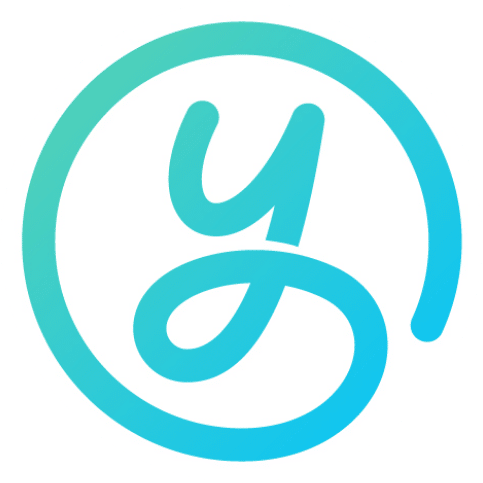If you are looking for guidance on the McMaster Health Sciences (BHSc) Supplementary Application, as well as essay examples and templates, then you’ve come to the right place.
This Application Prep guide will be updated for the 2023/2024 application shortly. We are prioritizing supporting our students with breaking down the application and will share this publicly shortly.
Here are the 2023/2024 questions.
Before you dive in, it’s important to understand that the admissions committees receive thousands of applications every year. To help you stand out from the crowd, you need to write essays that demonstrate your strong problem-solving, critical thinking, and communication skills, while also showing who you are, where you came from, and what’s important to you.
We recommend reading both our Deductive Communication Approach™ and Narrative Communication Approach™ skills guides to empower you with the skills to communicate in a clear, compelling, and concise manner.
You’ll notice the essay templates below follow these 2 communication styles. The purpose of sharing these structures is to help teach you best-practice processes for communication.
Using this structure does not mean your essays will be the same as other students because it is designed to help you create unique answers that are completely authentic to your individual identity and experiences.
We also suggest following the 5-step essay writing process we teach (scroll to the bottom of each communication skills guide).
If you’re serious about getting into McMaster Health Sciences and reaching your fullest post-secondary potential, connect with a coach. It’s never too early to receive coaching.
For more information about McMaster BHSc, check out this free McMaster Health Sciences Program Guide and this informative video that one of our coaches, a McMaster alumna and former Supp App reviewer, created to help students just like you.
We would also like to highlight that we are NOT an application writing service. We will not write your application for you. We’re here to support your holistic development so you can write the best application possible.
Table of Contents
- 2023/2024 McMaster BHSc Supplementary Essays: Questions; Tips for Writing; Templates; Examples; and More
- 2022/2023 McMaster BHSc Supplementary Essays: Questions; Tips for Writing; Templates; Examples; and More.
- 2021/2022 McMaster BHSc Supplementary Essays: Questions; Tips for Writing; Templates; Examples; and More.
- 2020/2021 McMaster BHSc Supplementary Essays: Questions; Tips for Writing; Templates; Examples; and More.
2023-2024 McMaster Health Sciences Supplementary Application Questions & Examples
This year, McMaster’s health sciences program asks applicants to answer two questions (#1 and #2), and each question has 3 options to choose from (A, B, C).
You must choose ONE option from Question 1 and ONE option from Question 2 — for a total of 2 essays.
Each essay response will be limited to 1500 characters (not words), including punctuation and spaces.
It is vital that you choose a question that resonates with your personal experiences. Without a relatable question and answer, your response will not sound genuine to experienced admissions officers.
Before getting started, make sure you choose the right question for YOU. That’s why we created the McMaster BHSc Supp App Success Checklist (go to File > Make a Copy). Reflect upon your personal experiences and connect with your coach to make sure you decide on a good question that resonates with you.
Fill out Step 1 and Step 2 of the checklist so you can dive into each question with confidence.
The worst feeling is spending hours on an essay, then reconsidering if you should be answering another question, so save yourself time and start here. 🙂
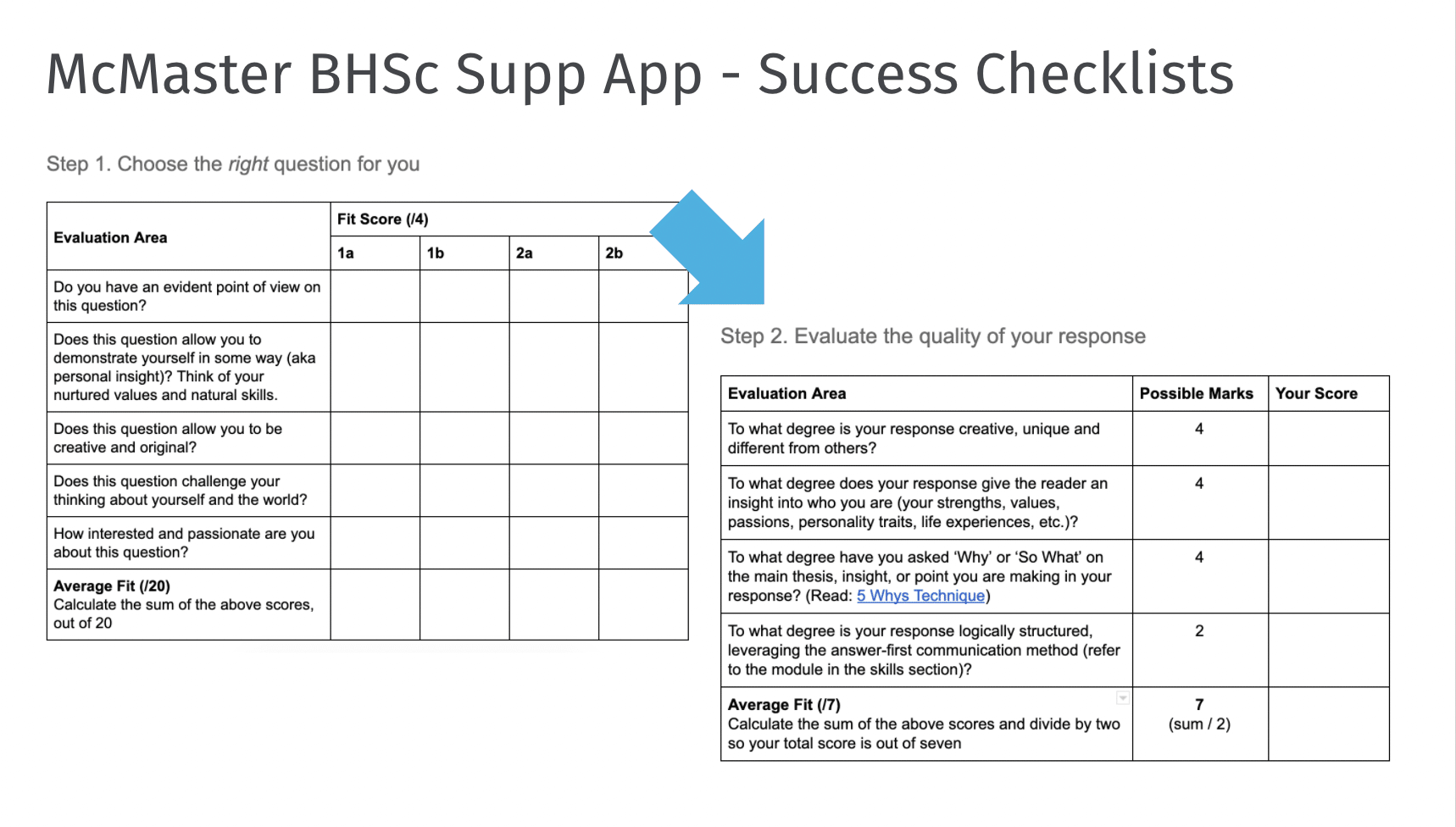
McMaster Health Sciences Supplementary Application: Question 1, Option A
In Four Thousand Weeks: Time Management for Mortals, Oliver Burkeman writes “We treat our plans as though they are a lasso, thrown from the present around the future, in order to bring it under our control. But all a plan is – all it could ever possibly be – is a present-moment statement of intent. It’s an expression of your current thoughts about how you’d ideally like to deploy your modest influence over the future. The future, of course, is under no obligation to comply.” Tell us about a time things didn’t go according to what you had planned, but things ended up working out well anyway.
McMaster Supplementary Application: Question 1A Breakdown
A key word in this question is ‘plan’. In life, planning involves a systematic process where individuals set their goals, determine the strategies, and outline the tasks and schedules to achieve these goals.
This question invites you to reflect on instances where your plans, despite being well-thought-out and meticulously crafted, did not unfold as expected due to unforeseen circumstances or variables beyond your control. Perhaps you meticulously planned a project, considering all foreseeable challenges, yet an unexpected hurdle caused a deviation from the anticipated path.
It’s important to introduce a specific scenario at the beginning of your essay, detailing your planning process, the unexpected turn of events, and the ensuing results. From here, you can elaborate on themes such as adaptability, resilience, or learning from unforeseen challenges.
Focus on articulating how you navigated through the unpredicted challenges and what lessons were learned from the experience.
Through this narrative, you get to show the admissions committee a deeper understanding of your personal development and your planning, adaptation, and growth from the unexpected.
Check out the following template for help on structuring your essay:
| Overarching Theme/Narrative: |
| Hook – Optional (10% – 150 characters): Start with a compelling snapshot of your plan going awry. Introduce the scenario with an engaging detail or moment of surprise. |
| Context (25% – 375 characters):Provide background on your original plan. Briefly describe what you planned and why, focusing on your intentions and expectations. |
| Catalyst (20% – 300 characters):Explain the turning point where your plan deviated. Describe the unforeseen event or circumstance that changed your course. |
| Outcome (25% – 375 characters)Share how the situation resolved itself positively. Focus on the positive aspects or opportunities that emerged from the change in plans. |
| Reflection (20% – 300 characters):Reflect on what you learned from this experience. Discuss how this experience has influenced your approach to planning, adaptability, and dealing with the unexpected. |
2024 McMaster Health Sciences Supplementary Application: Question 1, Option B
In his book “Outliers: The Story of Success,” Malcolm Gladwell explores the idea that success does not derive simply from a person’s character or talents or ability, but also about the accumulation of their experiences and opportunities, and notes that “Who we are cannot be separated from where we’re from.” Tell us about where you’re from, and how it has shaped who you are.
McMaster Supplementary Application: Question 1B Breakdown
The central phrase in this question is “Who we are cannot be separated from where we’re from.” This emphasizes the profound influence of our environment, culture, and the opportunities presented to us on our character and eventual success.
Initiate your essay by painting a vivid picture of where you come from. This could encompass the community you were raised in, the cultural norms that surrounded you, and the opportunities or challenges that were presented to you.
Where you are from doesn’t have to be completely unique, as many students come from similar backgrounds. But how you describe your background and how it has impacted you should be unique – consult with your coach to find effective ways of communicating this.
Aim to connect specific aspects of your background to your personal and academic growth. Perhaps the communal spirit in your neighborhood instilled a strong sense of empathy and teamwork in you. Or, the adversities you faced growing up fostered resilience and a problem-solving mindset.
Throughout your essay, you can touch on general themes of gratitude, resilience, adaptability, or continuous learning as they relate to your journey.
Also reflect on not just how your background has shaped you, but also on how you might leverage your unique experiences and insights in your future, particularly in your aspirations in the field of health sciences.
Quick Tips
- Cultural Insight: Highlight unique aspects of your culture or community and how they’ve influenced you.
- Specificity: Provide detailed examples to illustrate your points.
- Connection: Relate your background to your aspirations, showing a clear link between your origins and your goals.
- Tone: Maintain a balance between formal and personal storytelling.
Check out the following template for help on structuring your essay:
| Overarching Theme/Narrative: |
| Hook – Optional (10% – 150 characters): Begin with a vivid description or intriguing insight about your place of origin. |
| Context (25% – 375 characters): Elaborate on the specific aspects of your background—cultural, geographical, or familial—that have influenced you. |
| Catalyst (20% – 300 characters):Identify key experiences or opportunities in your background that significantly shaped your character, beliefs, or aspirations. |
| Outcome (25% – 375 characters)Describe how these influences have directed your personal or academic journey and contributed to your current goals or successes. |
| Reflection (20% – 300 characters):Reflect on the importance of your origins in shaping your identity and worldview. How do you see these influences playing a role in your future? |
2024 McMaster Health Sciences Supplementary Application: Question 1, Option C
Mary Oliver’s poem “The Summer Day” ends with the oft-quoted line “Tell me, what is it you plan to do with your one wild and precious life?” On Twitter, Jessica Kantrowitz @jfkantrowitz noted that when taken out of context, that single line is often interpreted as being about achievement and ambition – but it’s not. “Oliver’s own answer to her question,” Kantrowitz reminds us, “was to stroll idly through the fields noticing things.” Tell us about some small joy in your life that might go unnoticed by others.
McMaster Supplementary Application: Question 1C Breakdown
A pivotal phrase in this question is “small joy.” This question challenges you to showcase your personality and values through a tiny aspect of your life.
Begin your essay by introducing the small joy you’ve chosen to discuss. Try choosing something unique to you, and explain how you came to appreciate it.
For example, if your small joy is brewing a perfect cup of tea every morning, describe the ritualistic nature of this act, the aroma that fills the room, the warmth of the mug in your hands, and the tranquility that accompanies this simple routine. Explore how this daily ritual, though seemingly trivial, provides a moment of calmness amidst the chaos, a time for reflection, or a gentle start to the bustling day ahead.
This short description will reveal to the admissions committee values of care, meticulousness, and attention to detail.
Discuss how this small joy has influenced or mirrored your approach towards life, academics, or your future aspirations in healthcare. Perhaps it has taught you the value of patience, the importance of being present, or the beauty of simplicity amidst complexity.
Your narrative should extend beyond merely describing this joy; it should unveil a deeper understanding of how such simple pleasures contribute to your character, your perspective, and ultimately, how they align with your aspirations in the health sciences field. Your coach can help you connect these ideas, going beyond describing basic joys to showing off the deeper understanding that the admissions committee wants to see.
Quick Tips
- Detail: Focus on sensory details to bring your joy to life.
- Personal Connection: Explain why this joy is meaningful to you.
- Contrast: Highlight the difference between simple joys and grand ambitions.
- Engaging Tone: Keep the narrative engaging and introspective.
| Overarching Theme/Narrative: |
| Hook – Optional (10% – 150 characters): Start with a vivid, engaging description of a small, simple joy in your life. |
| Context (25% – 375 characters):Provide the background or setting of this joy. It could be a daily ritual, a quiet moment, or a small observation. |
| Catalyst (20% – 300 characters):Explain what makes this joy significant to you. What feelings or memories does it evoke? |
| Outcome (25% – 375 characters)Elaborate on the impact this joy has on your life. How does it influence your perspective or well-being? |
| Reflection (20% – 300 characters):Reflect on the broader implications of appreciating small joys. How does this perspective affect your approach to life and ambitions? |
McMaster Health Sciences Supplementary Application: Question 2, Option A
McMaster University offers an enormous variety of courses, with diverse possibilities across the Faculties of Business, Engineering, Health Sciences, Humanities, Science, and Social Sciences. With courses on things like pop culture history, sustainable chemistry, Indigenous futurisms, robotics, sports management, and nearly anything else you can think of, there is a huge range of opportunity for intellectual development. Browse through McMaster’s Course Calendar for 2023-24 – if you were to attend McMaster University, and you could take any non-Health Sciences course as an elective (that is, any course that does not start with the prefix “HTHSCI”), which one would you take, and why? (For the sake of this question, you can assume that you would meet all the necessary prerequisites.)
McMaster Supplementary Application: Question 2A Breakdown
A vital component of this question is exploring your interdisciplinary interests and demonstrating a willingness to engage in intellectual development beyond your primary field of study.
It encourages you to identify a course that not only piques your interest but also potentially complements or enriches your understanding and approach towards health sciences.
Begin by browsing through the McMaster’s Course Calendar for 2023-24, exploring the array of courses offered across different faculties. Read up on the various course details, and once you have selected a course that intrigues you, you can even go on ratemyprofessor to look up information about the professor teaching the course.
With this background information, start your essay by briefly introducing the course and how it connects with your background. This sets the stage for your readers to understand your choice.
For example, a German student with significant cultural involvement with their background may choose to write about the course “Germany Through the Ages: Culture and Society.”
Touch on what the course is about, but focus on how it connects with your culture.
The student in the example might explore how taking this course would broaden their understanding of German history, while making sure to give specific examples.
As you delve deeper into your narrative, talk about why this particular course appeals to you. Is it a long-standing interest, a newly discovered passion, or a subject that aligns with your broader academic or professional goals? Describe what aspects of the course excite you and why you believe it would be a valuable addition to your academic journey at McMaster.
Furthermore, reflect on how this course could intersect with your health sciences education. Perhaps the interdisciplinary knowledge would provide a fresh perspective, spark innovative ideas, or enhance your ability to address complex health challenges. For example, understanding sustainable practices in chemistry could foster a deeper appreciation for sustainable healthcare solutions.
In your conclusion, reiterate the value you see in branching out academically and how this reflects your overall intellectual curiosity and commitment to a well-rounded education. Emphasize how the chosen course could enrich your McMaster experience, contribute to your growth as a healthcare professional, and potentially, lead to interdisciplinary collaborations in the future.
Tips
- Connection: Draw connections between the course and your interests or goals.
- Specificity: Be specific about why this course appeals to you and how it aligns with your aspirations.
- Broader Perspective: Consider how this course fits into a well-rounded education.
- Engaging Tone: Maintain an engaging and thoughtful tone that reflects your genuine interest.
Check out the following template
| Overarching Theme/Narrative: |
| Hook – Optional (10% – 150 characters): Start with an engaging statement about your intellectual interests or curiosity in a specific field or subject. |
| Context (25% – 375 characters):Describe the course you have chosen, including its title and a brief description. Explain why this course piqued your interest. |
| Catalyst (20% – 300 characters):Discuss what specifically about the course aligns with your interests, goals, or future aspirations. |
| Outcome (25% – 375 characters)Elaborate on how you envision this course contributing to your academic journey and personal development. |
| Reflection (20% – 300 characters):Reflect on the importance of interdisciplinary learning in your education. How does this elective fit into your broader academic or career goals? |
McMaster Health Sciences Supplementary Application: Question 2, Option B
You have been selected to compete as a contestant on your favourite TV competition show (past or present), where the producers will donate $25,000 to the cause of your choice if you win. The show can be a conventional game show (for example, Jeopardy!, Family Feud, or Wheel of Fortune), a ‘reality’-type competition (for example, Alone, Survivor, or The Amazing Race), or a talent- or skill-based contest (for example, Project Runway, So You Think You Can Dance, or The Great British Bake Off). What show would you want to be on, and what cause would you choose to direct your winnings to?
McMaster Supplementary Application: Question 2B Breakdown
Creativity is crucial for this question. You should divide this question into two parts: the first part is the game show that you choose and why. The “why” part allows you to showcase what differentiates you from every other applicant. The second part is what you would direct your winnings to and why.
The purpose of this question is to let you show off your personality and values beyond academics. What social challenges do you care about? Be sure to connect with how you think your winnings can help resolve them.
For instance, if you choose Jeopardy!, you might express your enthusiasm for the wide range of topics the show covers, and how it challenges contestants to think quickly and accurately. This could also be a subtle way to highlight your broad knowledge base and quick thinking skills, which are essential in the field of health sciences.
Next, transition to discussing the cause you would choose to direct your winnings to. This is where you can reflect on your values, concerns, or passions. Whether it’s a local healthcare initiative, a global health cause, or a community project, explain why this cause holds significance for you.
For example, a student might choose to direct their winnings towards a mental health initiative because of their struggles within their family. They could discuss the importance of mental health support awareness, and possibly link it to their aspiration to promote holistic health care. This part of the essay is crucial as it unveils your awareness of societal or global issues and your desire to contribute positively.
Now, intertwine your choice of show and cause by reflecting on how participating in this show could potentially amplify the message or support for your chosen cause. Perhaps the platform could serve as a means to spread awareness, or the skills demonstrated on the show could symbolize the competencies you wish to employ in addressing the cause.
As you conclude, reiterate your excitement for the chosen TV competition show and the impact the prize money could have on your selected cause. Reflect on how this imaginative scenario encapsulates your interests, values, and the change you wish to contribute to, painting a vivid picture of your personality and aspirations.
Quick Tips
- Think through what will have the greatest impact with $25k. The amount is important. Don’t be too ambitious with the money – be realistic.
- It’s less about the show you choose and more about the why, but a more unique show will help differentiate
- Be genuine
Check out the following template:
| Overarching Theme/Narrative: |
| Hook – Optional (10% – 150 characters): Capture the reader’s attention with a unique angle or personal connection to the TV show or cause. Think about an intriguing fact or personal story related to your choice. |
| Context (25% – 375 characters):Provide background information about your chosen TV show and cause. Briefly explain why the show appeals to you and how it aligns with your skills or interests. Mention why the cause is important to you. |
| Catalyst (20% – 300 characters):Describe what inspired your choices. Focus on a moment or event that drove you to select this particular show and cause. |
| Outcome (25% – 375 characters)Envision your participation and its potential impact. Discuss how competing would benefit both you and the cause. Be imaginative but realistic. |
| Reflection (20% – 300 characters):Consider what your choice says about your values, goals, or life philosophy. Avoid clichés and strive for personal insights. |
McMaster Health Sciences Supplementary Application: Question 2, Option C
In Plutarch’s collection of essays, Moralia, he writes: ‘The correct analogy for the mind is not a vessel that needs filling, but wood that needs igniting. Suppose someone were to go and ask their neighbours for a fire and find a substantial blaze there, and just stay there continually warming themselves: that is no different from someone who goes to someone else to get some of their rationality, and fails to realize that they ought to ignite their own intellect.’ Tell us about a learning experience you’ve had that felt like a fire being kindled.
McMaster Supplementary Application: Question 2C Breakdown
The metaphor “a fire being kindled” invites you to reflect on a learning experience that ignited your curiosity, stimulated your thinking, and propelled you into a proactive exploration of knowledge. The most critical aspect of this question is, once again, personal reflection. Start by looking back at your experiences, and talk about them with a family member, friend, or your coach.
By having different perspectives to communicate with, you can narrow down all your experiences and find the one that is unique and completely different from everyone else – and fits best the prompt.
Once you decide on your experience, begin your narrative by introducing the learning experience that felt like a kindling fire. Describe the setting, the topic or subject at hand, and the initial spark that triggered your curiosity. This sets the stage for your readers to delve into the journey of intellectual ignition you embarked upon.
For instance, if your kindling experience was a challenging biology project that pushed you to explore the intricacies of a particular physiological process, paint a vivid picture of the challenge posed, the intrigue it generated, and the initial steps you took to unravel the complexities.
Make sure to articulate the processes, challenges, and triumphs you encountered in your quest for understanding. Explore the transformation from a mere receptacle of information to an active seeker of knowledge. Reflect on how this experience resonated with Plutarch’s analogy of igniting one’s intellect rather than merely gathering information from external sources.
For example, did you engage in extensive research, collaborate with peers, seek guidance from mentors, or perhaps even stumble upon new questions that further fueled your intellectual fire? Discuss the satisfaction, growth, and the enhanced understanding that came from actively engaging with the subject matter.
Furthermore, explore how this ignited curiosity transcended beyond the initial learning experience. Did it lead to further exploration of the subject? Did it impact your approach to learning in other areas? Did it contribute to your aspiration towards a career in health sciences?
For instance, if the project instilled a deeper understanding and appreciation for the biological mechanisms underlying health and disease, reflect on how this enhanced understanding steers your academic and career aspirations in health sciences.
In your conclusion, reflect back on the journey, emphasizing the enduring impact of this ignited curiosity on your academic pursuits, personal growth, and future aspirations in the health sciences realm.
Quick Tips:
- They want to see that you can take learning experiences into the future with you, that’s what they mean by “a fire being kindled”—the learning is a spark
- The concept of double-loop learning may be helpful to learn about
- Reflect very deeply about the learning, a surface-level learning will blend in
Structural Template:
| Overarching Theme/Narrative: |
| Hook – Optional (10% – 150 characters): Start with a vivid or intriguing moment from your learning experience. Open with a specific detail or moment that sparked your interest or curiosity. |
| Context (25% – 375 characters):Set the scene for your learning experience. Describe the setting or background of your experience. What were you learning and why? |
| Catalyst (20% – 300 characters):Explain what ignited your intellectual fire. Focus on a key moment, challenge, or realization that deeply engaged you in the learning process. |
| Outcome (25% – 375 characters)Describe the results of your ignited passion or curiosity. How did this experience change your approach to learning or your perspective? |
| Reflection (20% – 300 characters):Reflect on the significance of this experience in your personal and educational journey. Connect this experience to your broader goals, values, or understanding of yourself as a learner. |
2022-2023 McMaster Health Sciences Supplementary Application Questions & Examples
For the 2022/2023 McMaster Health Sciences Supplementary Application, there are 2 questions (#1 and #2), and each question has 3 options (A, B, C).
You must choose ONE option from Question 1 and ONE option from Question 2 — for a total of 2 essays.
Access the 2023 McMaster Health Sciences Supplementary Application Questions here,
Click here for your 2023 McMaster Supp App essay template, which we created to help you write unique and memorable essays (and keep reading for breakdowns, templates, and examples for each question).
REMEMBER: There is a 1,500 character limit for each essay (including spaces and punctuation).
The McMaster Health Sci OUAC application deadline is January 12, 2023.
For the Supp App, Level 1 Applicants will receive instructions about how to access the online submission site in February 2023, and Level 2 Applicants will receive the same information in early May 2023.
McMaster BHSc Supplementary Applications are due early to mid February and all other supporting documentation is due on April 1, 2023 (check here for important dates and deadlines) and if you have any questions connect with a coach for support.
Before getting started, make sure you choose the right question for YOU. That’s why we created the McMaster BHSc Supp App Success Checklist (go to File > Make a Copy).
Fill out Step 1 and Step 2 of the checklist so you can dive into each question with confidence.
The worst feeling is spending hours on an essay, then reconsidering if you should be answering another question, so save yourself time and start here. 🙂

McMaster Health Sciences Supplementary Application: Question 1 – Overview
Before getting started on the Question 1 options below, we suggest you read our Narrative Communication Approach™ Skills Guide.
Questions 1A, 1B, and 1C are what we call personal questions, designed to allow the admissions committee to learn more about you, your experiences, what you’ve accomplished (and want to accomplish), what you’re good at, and more (learn more about personal questions here and how to approach them here).
The Narrative Communication Approach™ is a framework that helps you tell a memorable story that emotionally connects with the reader, while also communicating your skills, experiences, and interests in a unique and authentic way.
The key for these questions is creativity and personal insight. You want to show that you have taken the time to evolve and learn because of the experiences you’ve had and that you have really thought about the world around you (and your place in it).
We know that these McMaster Health Sciences essay questions can seem a bit overwhelming, so if you need support connect with a coach for help.
2023 McMaster Health Sciences Supplementary Application: Question 1, Option A
In Season 2, Episode 21 (“Peak Performance”) of STAR TREK: THE NEXT GENERATION, the android Data loses a strategy game to an opponent; believing that the loss means that he must be malfunctioning, he asks to be removed from duty. Captain Jean-Luc Picard tells Data that “it is possible to commit no mistakes and still lose. That is not a weakness – that is life.” Discuss.
McMaster Supplementary Application: Question 1A Breakdown
ICYMI (because you probably weren’t born yet) Star Trek: The Next Generation is an American science fiction tv series that ran from 1987-1994. It follows the USS Enterprise and its crew as they explore space (learn more about the show here).
The crew is made up of all types of beings from the galaxy, including humans, androids, and aliens. Captain Jean-Luc Picard (a human being) is the Captain of the USS Enterprise and Data is a self-aware android and is second officer.
A key word in this question is ‘strategy’. In a game, a player’s strategy is being able to anticipate and influence the outcome of the game based on their actions and the actions of others.
Strategy involves both logical analysis, or anticipating what the other player will do and determining specific moves that will act in your favor and lead to victory. Strategy also involves social analysis, or reading the player sitting across from you and basing your next moves on that (think reading a player’s bluff in a poker game or interpreting someone’s facial expressions).
As an android, Data is a master strategist. He’s completely logical and can anticipate what the players in the game will do while accounting for chance and odds of winning. But, his social game is lacking a bit.
Jean-Luc Picard is a human, and Data (although a self aware, sapient being that looks human) is not a human. This means that even though he might be skilled at logical analysis, Jean-Luc Picard may be better at social analysis, namely playing a social game and beating his opponent because he can read the silent, indirect physical cues that people give without knowing it (think body language, eye contact, facial expressions, etc.).

While Data is playing a highly logical game, Jean-Luc Picard can pick up on implicit social cues that Data probably isn’t even aware that he’s making — and that’s how he wins the game.
If Data and Jean-Luc were playing a game that was purely driven by numbers and had no social aspect, like AlphaGo, Data would probably win. But Jean-Luc has an edge because, as a human, he has the skills to be able to read the person across from him.
Think of a highly social game like Jimmy Fallon’s Box of Lies, where players have to describe what’s in the 9 mystery boxes in front of them and the other person has to figure out if they’re lying or telling the truth (check out this example with Taylor Swift):
It really doesn’t matter how the person describes the object or what the object is, but what’s important are the social cues, body language, and facial expressions they give (and whether the other person can pick up on the lie using those). Jean-Luc Picard would be really good at this game, and Data would be awful at it because he lacks the social analysis ability.
Once Data loses he’s surprised that he lost because believes that winning is a given — after all, he followed the strategy and did the necessary logical analysis. When he loses, he thinks something is wrong with his system.
This question asks you to discuss the statement that Jean-Luc Picard says: “It is possible to commit no mistakes and still lose. That is not a weakness – that is life.”
There are many ways that you can approach this question while thinking about the discussion about strategy and humans vs. computers from above.
Now of course Data would likely have a hard time understanding this. After all, “that is life” might not hit home because he’s not alive. What Data can do, however, is learn from this gap in his strategy and become stronger for the next game. By learning to accept mistakes and move forward, Data also becomes more human which will help his social analysis next time.
Now that you have a better understanding of the context of this scenario, let’s think about what to include in your essay.
To provide focus to your essay, we recommend that you draw upon an experience where something didn’t necessarily go your way, even though you thought you followed all the right steps. Introduce this situation right at the beginning of your essay, providing the necessary background information wherever possible. Focus your essay around a theme (e.g. resilience, problem solving, etc.) if possible.
Maybe you were having a hard time in your math class so you hired a tutor, spent a really long time studying, and still didn’t get the midterm mark you were hoping for. Or, maybe you took on the big responsibility of organizing a fundraiser and spent months organizing everything and then COVID hit and everything was canceled. Basically any experience where you made all the effort for everything to go well, while accounting for variables and setbacks, and things still didn’t turn out how you planned.
A key thing to focus on here is describing how you dealt with the conflict or loss (and how this experience made you more resilient because of it). You could have been really disappointed at first and thought something was wrong with you (just like Data).
What’s important is not the actual mistakes you made, but the personal growth you experienced because you lost.
DON’T stick to surface level learnings, but dig deep and think about how this situation helped to fundamentally change you as a person and influenced you moving forward. Data was completely changed by this experience, and you should focus on the same type of growth and change.
Need some extra help with this question? Connect with a coach for support.
McMaster Supplementary Application: Question 1A Template
Get started on your template here (click File > Make a Copy and save it to your computer).
REMEMBER: There is a 1,500 character limit for this question (including spaces and punctuation).
- Hook (Optional) (~100 characters)
- Capture the reader’s attention and give a preview of what’s to come, briefly discussing what this quote means to you.
- Context (~300 characters)
- Discuss an experience where this quote was particularly relevant to your life, answering the 5Ws (who, what, when, where, why). Set up the ‘before’ scenario as much as possible (i.e. before you encountered conflict, challenges, etc.).
- Catalyst (~300 characters)
- Talk about the event/situation that was a turning point in the experience you described above. Describe your emotions as much as possible to help create a connection with the reader. This is the ‘after’ scenario that was the result of the ‘before’ scenario from the Context section.
- Outcome (~400 characters)
- Describe how you dealt with the conflict/challenge/loss, including detailing steps you took to resolve it, any additional challenges along the way, etc. Highlight skills like problem solving and leadership as much as you can.
- Reflection (~400 characters)
- Provide 1-2 deep learning outcomes that happened because of this experience. Paint the picture of how it helped to fundamentally change/influence you as a person, and how you will use these lessons in the future and as a student at McMaster Health Sciences.
McMaster Supplementary Application: Question 1A Example
Here’s an example to this McMaster BHSc Supp App question.
REMEMBER: This is an EXAMPLE ONLY and is NOT meant for you to copy. Why? First and foremost, this is plagiarism and is a serious offense. Plagiarizing these essays will result in immediate disqualification from the admissions process. This can be easily detected using technology and application reviewers are usually trained and/or able to spot when an application isn’t original and does not align with an applicant’s background, personality, values, etc.
If you’d like support from a Youth Coach (including McMaster BHSc grads) to ethically help you come up with your own response to this essay, please reach out.
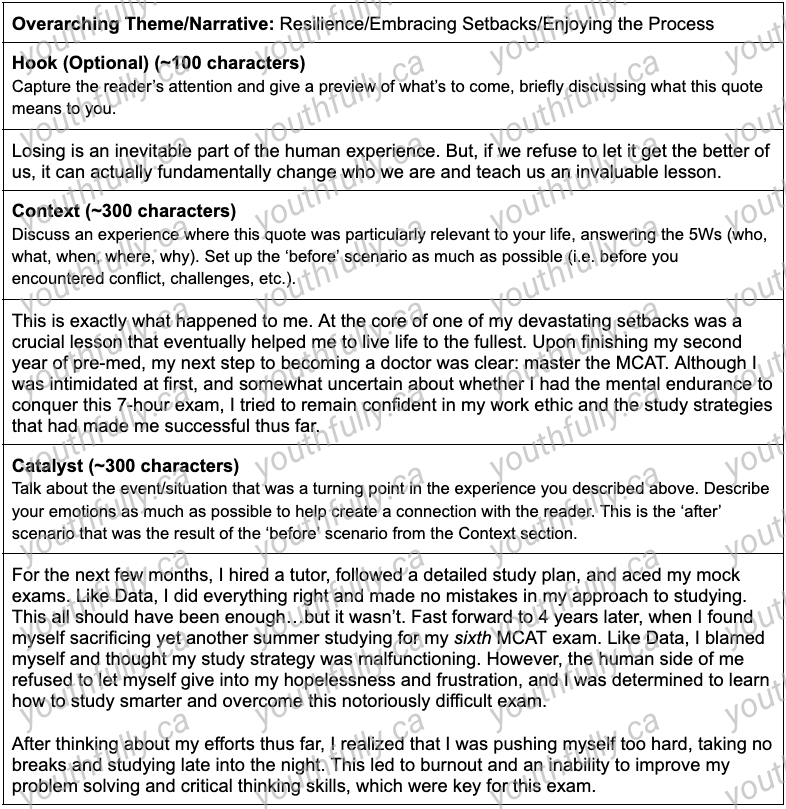
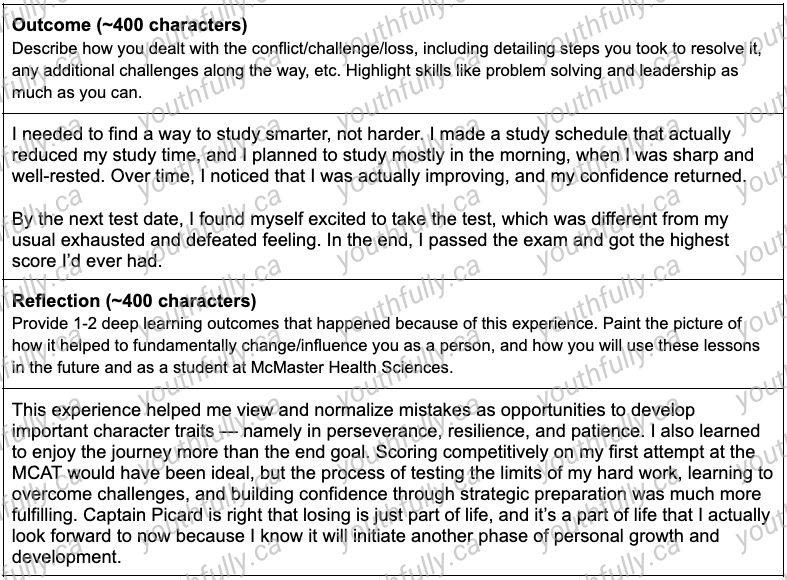
Need some help coming up with an answer to this essay question? We got you! Connect with a coach now for support.
2023 McMaster Health Sciences Supplementary Application: Question 1, Option B
Thomas King gave the 2003 CBC MASSEY LECTURE SERIES entitled The Truth About Stories: A Native Narrative. In it, he comments on the centrality of dichotomies (that is, a sharp binary distinction between two things understood to be opposites) in many Western narratives: “We do love our dichotomies. Rich/poor, strong/weak, right/wrong… We trust easy opposites. We are suspicious of complexities, distrustful of contradictions, fearful of enigma.” What dichotomy do you find to be especially problematic, and why do you think it is important to take a more complex view of that issue?
McMaster Supplementary Application: Question 1B Breakdown
When approaching this question, you should first understand what a dichotomy is.
A dichotomy is defined in the Oxford dictionary as, “a division or contrast between two things that are or are represented as being opposed or entirely different.”
Put simply, a dichotomy is a pair of things opposites — like night and day; happy and sad; black and white.
As humans, we are naturally drawn to opposites because most of us like patterns and consistency, and things that just make sense easily.
Creating a dichotomy makes things easier to classify and stick neatly into a box or category. But, when things don’t fit, as humans we tend to see it as deceitful and we don’t entirely trust it.
It can be a bit tough to find a good dichotomy to discuss in your essay. We’ve found that a good place to start is opening up a thesaurus (like here) or random word generator (like here) and then choosing a word that pops out to you and seems interesting. Then, find the antonym (or opposite) of that word — and voila, you have your dichotomy.
COACH’S TIP: When choosing a dichotomy, try to think beyond general social constructs and traditional concepts (and definitely don’t choose any one of the ones listed in the question). Make your dichotomy as unique as possible (e.g. AI vs. human; subjective vs. objective, internal and external; mind and body etc.), and keep it authentic to your interests and values. Also, if you can make it related to health sciences, that’s even better. If you need some help coming up with a dichotomy, connect with a coach anytime for support.
Another important thing to consider when thinking about dichotomies is that middle area that doesn’t always fit perfectly on one side or the other. Like in day vs. night, there’s the dawn and dusk (i.e. that point that’s stuck between the two and isn’t fully one side or the other).
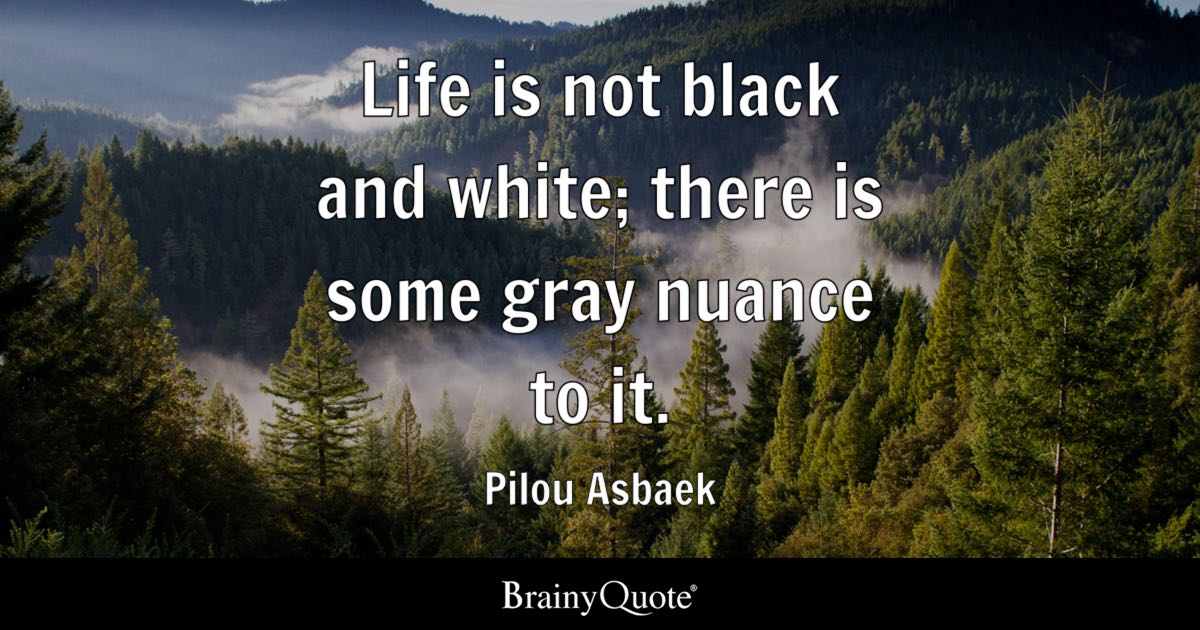
You’ve probably come across this saying (or one that’s similar to it) a few times in your life.
What does it mean? Well, sometimes things aren’t always as straightforward as they first appear, but there’s some room for interpretation — it’s that infamous ‘gray’ area between the two opposites.
When choosing a dichotomy to discuss, we recommend that your dichotomy has this gray area that you can discuss more in depth.
Why? The question asks you to identify a dichotomy that you find ‘especially problematic’. It’s that middle area that makes it problematic, and that’s the real focus of this question.
Your dichotomy should be two things that don’t always have a clearly defined opposition. Instead, there’s a clearly visible gray area in the middle, making it important to take a more complex view of that issue.
In the second part of the question, you focus on that perfect balance of the two opposites and emphasize that this middle point is better than either of the opposites by themselves.
For example, think of a restrictive diet on one side and then eating everything in sight on the other side. Most times, people do better when they find a workable middle ground that provides balance, like eating healthy most of the time and indulging in some cheese pizza every once in a while. In this dichotomy (i.e. restriction vs. indulgence), it it’s important to take a more complex view of that issue because we have to account for the physiological and psychological aspects of dieting and health in the long-term, which is often not possible by staying on one side of the dichotomy.
To make your essay unique and memorable, we recommend that you tie your dichotomy to a theme and specific experience, especially in the second part of the question. This will show that you have firsthand experience about the importance of finding that balance (or gray area), and interpreting things differently than what’s easy or comfortable.
Use the experience to show why you’ve found that the balanced view between your dichotomy is better long term, as well as the steps you’ve taken to put this balance into practice. Then use the final part of the essay to discuss what this dichotomy has taught you about yourself and helped you grow and change your view of the world.
Need some help with this McMaster Health Sciences essay question? We got you! Connect with a coach to learn how to write an essay that gets noticed.
McMaster Supplementary Application: Question 1B Template
Get started on your template here (click File > Make a Copy and save it to your computer).
REMEMBER: There is a 1,500 character limit for this question (including spaces and punctuation).
- Hook (Optional) (~100 characters)
- Capture the reader’s attention and give a preview of what’s to come.
- Context (~200 characters)
- State what your dichotomy is, using the 5Ws (who, what, when, where, why) to give the reader enough information that they understand exactly what it is.
- Catalyst (~350 characters)
- Explain why you believe this dichotomy is problematic, providing an example using an experience from your own life. Paint a picture of the situation, describing how you felt and your initial reactions to connect with your reader on an emotional level. The goal is to convince them that considering the middle ground and taking a more complex view of that dichotomy is the right approach.
- Outcome (~450 characters)
- Talk about how the situation you described in the Catalyst section turned out, including what happened when you took the middle/balanced approach and it was necessary to consider the ‘gray area’. Briefly state what would have happened if you didn’t consider the middle ground, and stuck only with the strict opposites in the dichotomy.
- Reflection (~400 characters)
- Describe 1-2 things you learned from your experience, and how being open to taking a more complex view of traditionally opposite viewpoints (including the one you discussed above), has (and will) help you grow as a person. If possible, apply this growth/learnings to McMaster and your goal as a healthcare professional.
McMaster Supplementary Application: Question 1B Example
Here’s an example of an answer to this essay question.
REMEMBER: This is an EXAMPLE ONLY and is NOT meant for you to copy. Why? First and foremost, this is plagiarism and is a serious offense. Plagiarizing these essays will result in immediate disqualification from the admissions process. This can be easily detected using technology and application reviewers are usually trained and/or able to spot when an application isn’t original and does not align with an applicant’s background, personality, values, etc.
If you’d like support from a Youth Coach (including McMaster BHSc grads) to ethically help you come up with your own response to this essay, please reach out.
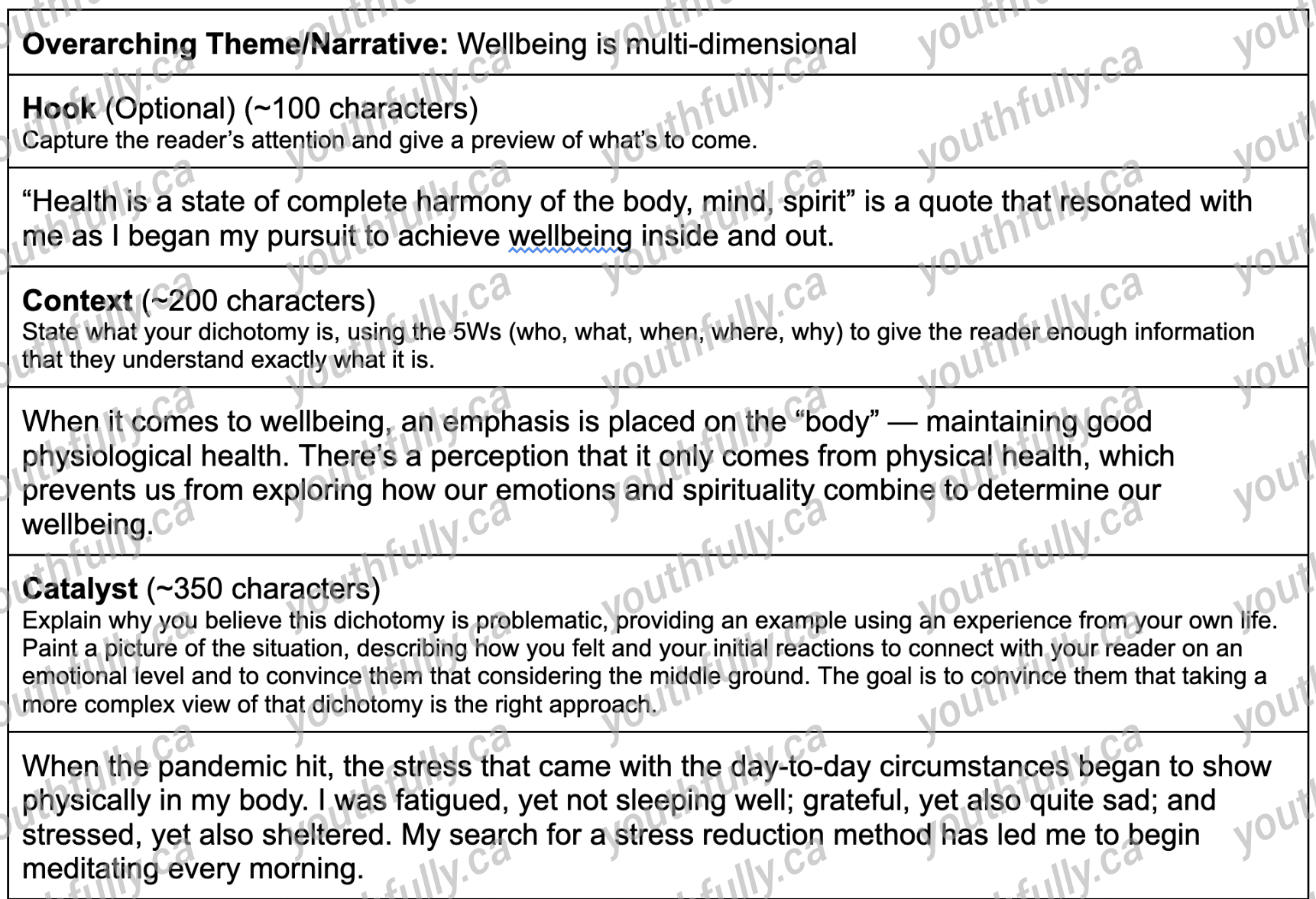
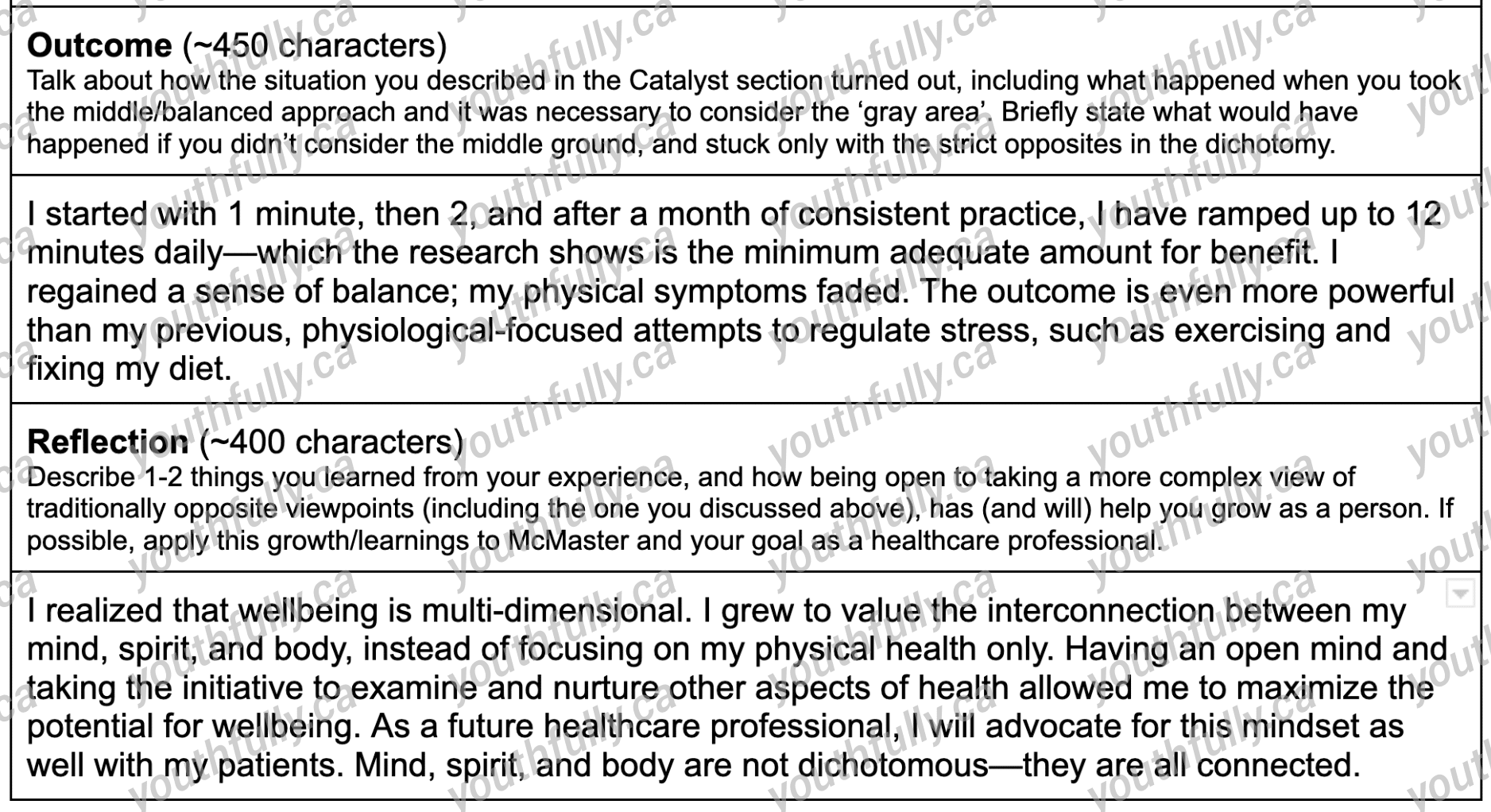
2023 McMaster Health Sciences Supplementary Application: Question 1, Option C
Every year, students in the BHSc (Hons) Program stage a musical. In 2022, the show was called Health Sci Hears a Who, in which the Program administration announced that all students needed to complete a special task in order to graduate. When the email arrived with instructions for the task, it consisted of a single word, “Who?”, with no additional guidance provided, and the characters needed to figure how to respond to that in order to complete the assignment. Now we turn that task over to you: Who?
McMaster Supplementary Application: Question 1C Breakdown
Your initial reaction to this question might be “Um….what?” rather than “Who?”. It’s definitely a bit confusing. But, we got you! 🙂
Here’s some background information that might be helpful.
The ‘Health Sci Hears a Who’ musical was on April 19, 2022 at the Zoetic Theatre in Hamilton. Here’s the Instagram page for the Health Sci Musical, and the post about the play:
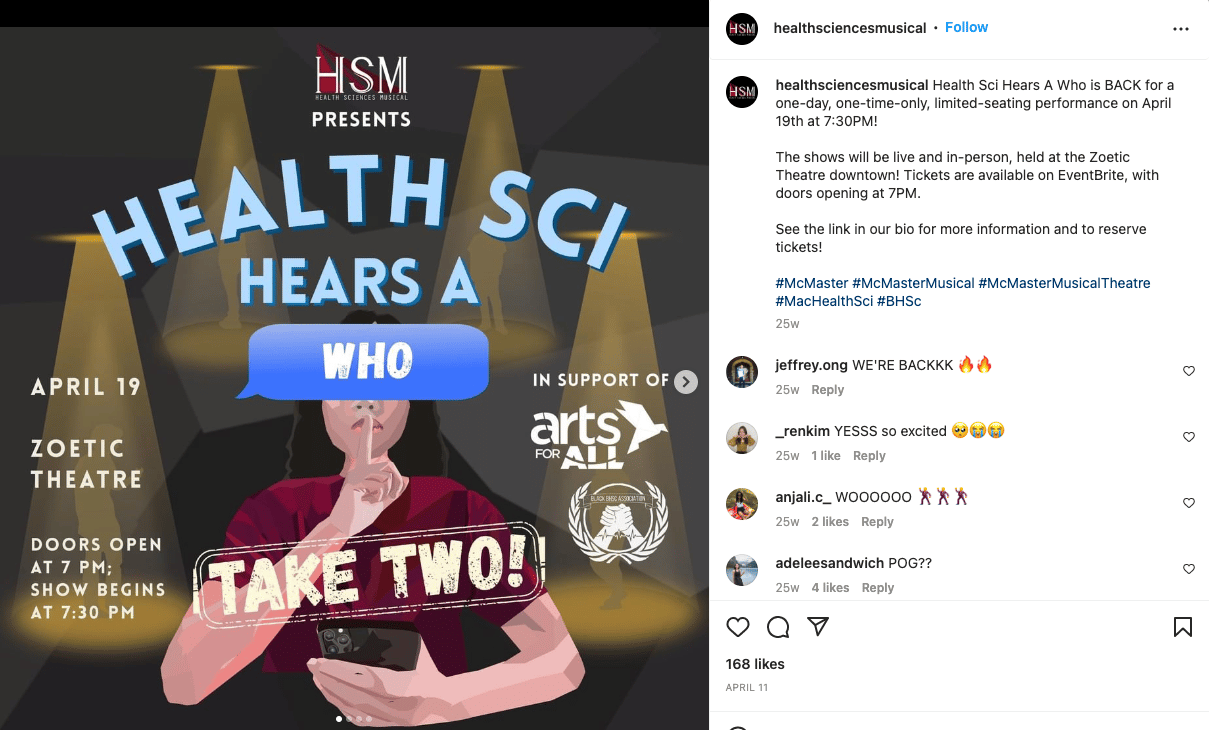
Before getting start on your essay, watch the full musical here:
When approaching this question, it’s important to remember that one of the things that makes McMaster BHSc one of the best Health Sci programs out there is its approach to learning.
McMaster BHSc uses an inquiry-based learning model, which is a unique interdisciplinary approach to learning that emphasizes using critical thinking, problem solving, research, and collaboration to come up with an answer to a problem (even without all the necessary information).
Think of this question as your first try using this learning approach.
We totally get that it can be really difficult and frustrating to figure out. However, many of the students we work with have told us that not always being given all the information they need to solve a problem actually makes them a better student in the end. Why? Well, this method reflects real-world situations, where you don’t have all the pieces to the puzzle and you must rely on your skills to figure things out.
Starting at 18:20 in the video above, the student talks about the instructions in a bit more detail — the students are given a prompt (“Who”?), and they can respond to this prompt in ‘any for individuals deem appropriate’.
Every single student must get a ‘pass’ grade in order for the whole group to be permitted to graduate.
This reflects the inquiry-based style of learning where the entire group must work together to find a solution. At times they panic because they can’t figure it out (1:15:00) and they think about giving up because the problem seems too difficult. This is their reaction to the inquiry-based style of learning we talked about above.
Eventually they find out that their friend Lex passed the assignment. How? Well, we’re told that Lex discovered that, even though she gets really stressed out trying to do well at school and be a student athlete, it was possible for her to get everything done AND still be kind to herself (1:38:45).
The group leaders get together to try to figure out how they can help their teams pass the project (starting at 1:42:10). They realize that each of them belongs to a unique friend group, and each group has a central insecurity and positive/negative trait (ex. Eugene’s group are all overachievers, Yuna’s group is obsessed with social media and not being their authentic self, and another member attaches their value to their academic achievements).
What they realize is that they need to embrace their insecurities and “have the confidence to share our truths for the world to see” (1:45:31). In the end, they all realize that they are enough if they are their authentic selves and that they should celebrate their differences. With this realization, they all pass the project, and they can graduate.
Based on this interpretation, what the prompt “Who?” centers around (and the main talking points you should address in your essay) is:
- What is the image of yourself that you share with the world?
- How is this different from the REAL qualities (good and/or bad) that make you truly unique?
- How should you celebrate these qualities (rather than hide them)?
- What steps do you need to take to accept your authentic self and initiate meaningful self growth?
The goal here is to allow the admissions committee to get a clear picture of who you are beyond your grades and extracurriculars, and it will help you stand out amongst other applicants. They want to see that you know yourself inside and out, and that you have the confidence to accept and be proud of who you are.
Maybe you have an interesting hobby, you are obsessed with collecting something, you’re a self-proclaimed overachiever, or something else. You want to focus on anything that makes you, you.
You might have already learned to accept your unique qualities, or you might still be hiding them. Either way is okay! The point is to show that you’re making an effort to embrace all the things that make you who you are (and to be proud of them!).
No matter what you focus your essay on, the most important thing to show the reader is that you have self-awareness and you’re in tune with yourself.
A good place to start is filling out your Student Identity Blueprint and picking a few things on there that are inseparable from who you are. Have a look under the 6 pillars (development, academic, extracurriculars, employment/volunteering, health/wellness, and finance/scholarships) and see what sticks out.
Another good place to look is your Susceptibilities — because many of us hide the things about ourselves that we take a bit too far or need a little work (just like Lex overextending herself and not taking time to take care of her mental wellbeing).
You can also chat with some family and friends (or your Youth Coach) and ask them to talk about a few aspects of your personality that make you different from everyone else they know (there might even be a few that you hadn’t realized before).
Then, think about how (and if) you share your interest in these things with the world, or whether you hide them because you’re afraid that people might judge you for them. You can also ask your family and friends for help with this too. This will give you some really valuable insight you can use here.
Finally, in addition to identifying what makes you unique and talking about how you show/hide your authentic self with the world (and how this has changed over time), you want to think about what this journey to self-acceptance has taught you (this will be important for the Reflection section of your template below). Focus on 1-2 learning outcomes that have fundamentally changed you as a person and will help you in the future and as a McMaster BHSc student.
Here are some questions to help get you thinking:
- How are your academic and professional goals related to those traits that make you who you are?
- How have your experiences shaped or changed you as a person?
- How have your experiences helped you accept your authentic self?
- How does your personality make you uniquely qualified to make a change in the world?
- How have you struggled to accept yourself for who you are? How did you overcome those challenges?
- How do you hope to continue your journey of acceptance in the future, and how can you help others do the same?
For Lex, her learning outcome was that she could do everything that everyone expected of her (family, school, extracurriculars, etc.) while still making the time to be kind to herself, accept herself for who she is, and make the time to do the things she loves. In the end, this would make her a better student and able to be more accepting and open with everyone she comes into contact with.
You want to try to come full circle in your essay and think about WHY it all matters both now and in the future.
If you need some help with this essay question, connect with a coach for support. Our Discovery Process is designed specifically to help students improve their self-awareness and identify and accept what makes them unique — and then use those qualities to reach their full post-secondary potential.
McMaster Supplementary Application: Question 1C Template
Get started on your template here (click File > Make a Copy and save it to your computer).
REMEMBER: There is a 1,500 character limit for this question (including spaces and punctuation).
- Hook (~100 characters) – Optional
- Quickly capture the reader’s attention and give them a preview of what’s to come.
- Context (~350 characters)
- Paint a picture of who you are and the 1-2 things that make you unique. These can be personality traits, a hobby, an experience, interest, etc. Be as descriptive as possible. Compare your description of who you are with the image that you present to the world. Briefly summarize how these two versions of yourself (authentic vs. made up) are similar or different.
- Catalyst (~300 characters)
- Describe a time or experience that initiated or contributed to your journey of self-acceptance. Focus on a time when you had the courage to share your authentic self with the world, providing as much detail as possible about the situation and how you felt so that the reader feels like they’re right there with you. Describe any struggles or setbacks you came up against along the way and how these impacted your journey.
- Outcome (~350 characters)
- Discuss what happened after this journey of self-acceptance and how it fundamentally changed you as a person. Be as detailed as possible when describing who you were before vs. who you were after this experience happened. Briefly state how this positively (or negatively) impacted your life.
- Reflection (~400 characters)
- Talk about how this experience and your efforts to accept and present your authentic self has taught you and changed you as a person. Discuss why your journey to self acceptance was so important for your growth as a person. Wrap up the essay by briefly stating how you hope to continue your journey of self-acceptance in the future both personally and as a McMaster BHSc student.
McMaster Supplementary Application: Question 1C Example
Here’s an example of an answer to this essay question.
REMEMBER: This is an EXAMPLE ONLY and is NOT meant for you to copy. Why? First and foremost, this is plagiarism and is a serious offense. Plagiarizing these essays will result in immediate disqualification from the admissions process. This can be easily detected using technology and application reviewers are usually trained and/or able to spot when an application isn’t original and does not align with an applicant’s background, personality, values, etc.
If you’d like support from a Youth Coach (including McMaster BHSc grads) to ethically help you come up with your own response to this essay, please reach out.
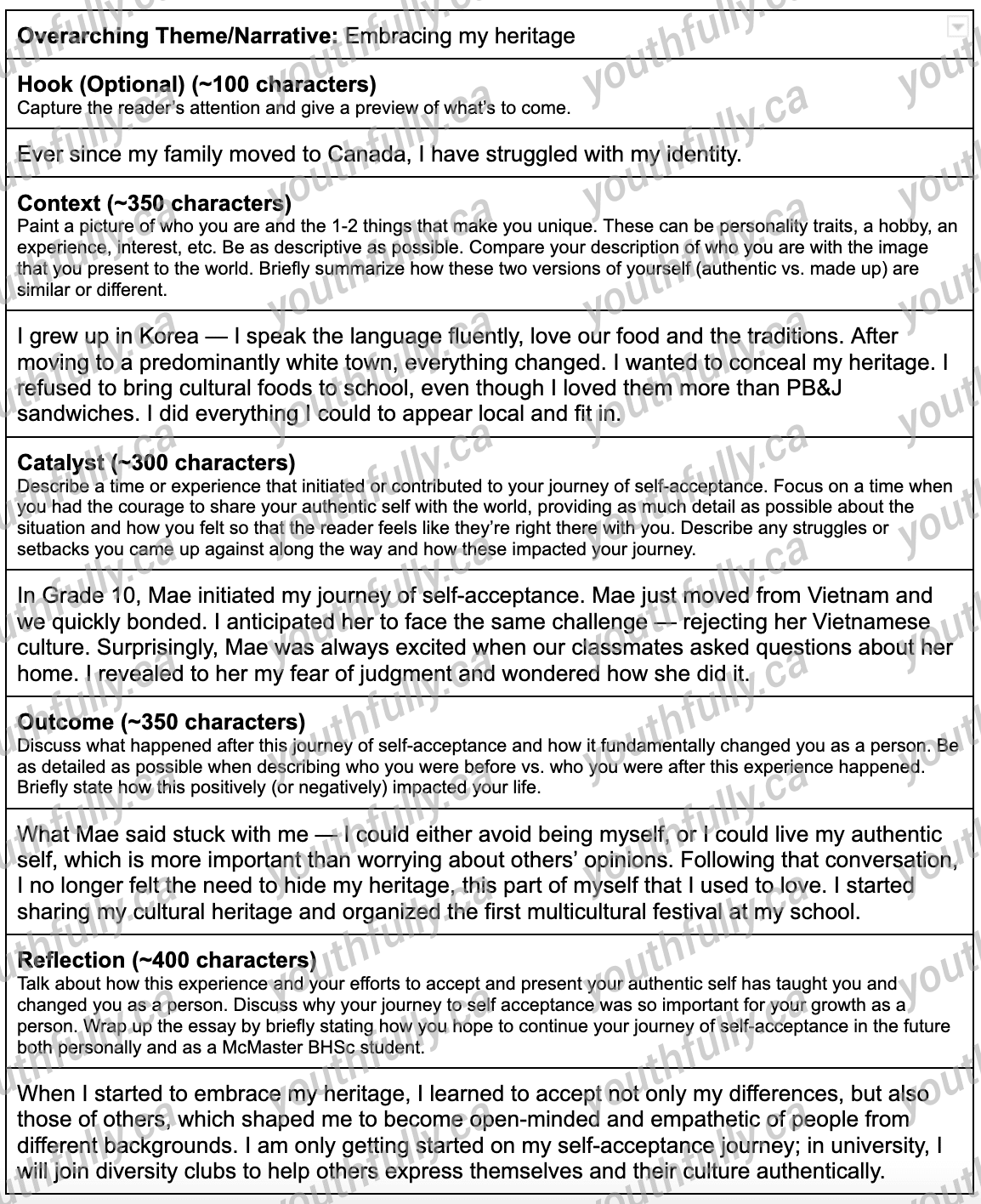
You Might Also Like
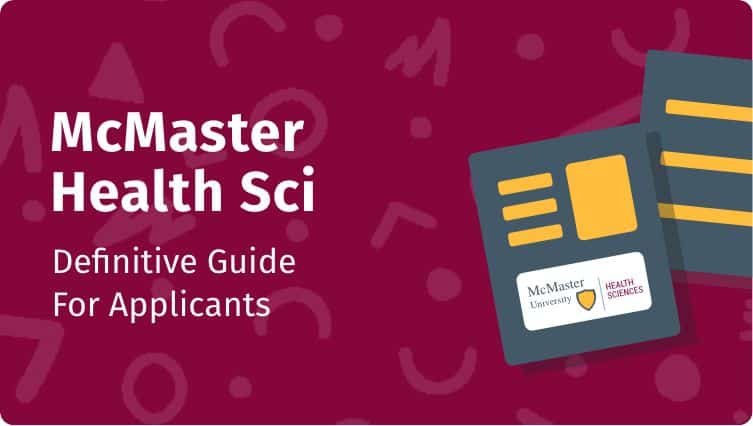
Program Guide
McMaster Health Sciences (BHSc): The Definitive Guide for Applicants (2024)
If you’re applying to McMaster Health Sciences (BHSc), or you’re simply interested in learning more about the program, this guide… Read more
McMaster Health Sciences Supplementary Application: Question 2 – Overview
Before getting started on the Question 2 options, we suggest you read our Deductive Communication Approach™ Skills Guide.
Questions 2A, 2B, and 2C are what we call problem-based questions designed to see how you think, so this guide will be key for helping you create logical and convincing arguments in your answer.
The Deductive Communication Approach™ is a ‘top-down’ method that lets you articulate structured problem solving in your essay, while also communicating your skills, experiences, and interests in a unique and memorable way.
The key for these questions is providing creativity and personal insight, while showing your ability to think critically and solve problems.
Every single strong applicant is going to analyze this question rigorously, so what unique lens or perspective can you incorporate to make yours stand out?
We know that these McMaster Health Sciences essay questions can seem a bit overwhelming, so if you need support connect with a coach for help.
2023 Health Sciences Supplementary Application: Question 2, Option A
In The Hill We Climb (2021), National Youth Poet Laureate Amanda Gorman wrote “…being American is more than a pride we inherit. It’s the past we step into and how we repair it.” What aspect of the past will you play a role in repairing?
McMaster Supplementary Application: Question 2A Breakdown
Before getting started, it’s important to do some research about important background information so you can fully understand what the question is actually asking you.
Here’s a quick breakdown of the key details:
- Who is Amanda Gorman?: Amanda is a 24-year old poet from Los Angeles. In 2017, she was named the first-ever National Youth Poet Laureate of the United Nations while she was studying at Harvard. Her work focuses on important social issues like feminism, race, oppression, and marginalization.

- What is ‘The Hill We Climb’ (2021): This is a poem that Amanda wrote witnessing the siege of the US Capitol in January 2021 when Joe Biden was elected as the new President of the United States. The poem is about unity, collaboration, and togetherness. It emphasizes the opportunity that the future holds for allowing us to come out of darkness and accept “all cultures, colours, characters and conditions of man.” Read the full poem here.
- Why is this poem significant?: The Hill We Climb has become famous because Amanda read it at the inauguration of President Joe Biden and Vice-President Kamala Harris. She read the poem with the purpose to “be able to use my words to envision a way in which our country can still come together and can still heal.”
Watch Amanda’s full address here (the quote taken from the poem, “…being American is more than a pride we inherit. It’s the past we step into and how we repair it,” is at 2:50-3:00):
Amanda is such an influential person, and despite being so young, she is the voice of an entire generation that is demanding better from her country and from people in general — as she says, anyone can influence others, no matter your background, where you come from, how old you are, or how much money you have.
We can each make a difference if we are united and collaborate with one another.
A main theme that can be drawn from this quote is about the responsibility that each of us has to learn about the past, without sugar-coating it and trying to fully understand all the violence, prejudices, upheavals, and injustices that come with it.
What’s most important is that, instead of us continuing in the same cycle of those actions and ignoring the bad, we must use what we’ve learned to find ways to make the future better.
As Amanda says early in the poem, the goal isn’t to be perfect, but to have the courage to seek change where it’s needed and fix the mistakes we’ve made.
“How we repair it” as stated in Amanda’s poem isn’t about simply making excuses for things that have happened in the past, but accepting that it happened, figuring out why it happened, and then putting the necessary mechanisms and checkpoints in place so that it doesn’t happen again in the future.
In this question, you’re asked to discuss what aspect of the past you want to play a role in repairing. For Amanda, she is looking to use her influence and her skills at uniting people through words to help create unity amongst a divided country, while helping people overcome biases, racism, sexism, and other harmful issues.
In your answer, you first must identify what you want to have a role in repairing (this is your Hypothesis/Answer of the Deductive Approach, which we will discuss more in the template below).
The aspect of the past that you choose doesn’t necessarily have to be linked to the country where you live or a societal issue like Amanda chose. It can be on a small scale, like something personal within your own life, or other important issues like climate change, a historical event, an issue or trend you noticed over the last few years, etc. — basically anything you think needs attention to help make the world and your life better.
COACH’S TIP: Make sure the aspect of the past you say you want to repair is actually something you genuinely care about. Don’t just choose an issue, event, cause, etc. just because you think it’s what the app reviewers want to hear. If you’ve completed our Self-Aware Student Assessment and filled out your Student Identity Blueprint, you should already have a pretty clear idea of some issues you genuinely care about changing or improving (especially if you’re an Innovator or Impacter).
Completing these two things will help you really think deeply about the things that have impacted your life, the influencers who’ve inspired you, etc. — and doing this self-awareness work beforehand can really help your answer stand out from others who haven’t thought about these things much. If you haven’t completed your Blueprint, connect with a coach now.
You should also be sure to provide enough context that the reader can get a really clear sense of the aspect of the past you’re talking about so there is no confusion.
Next, your essay should explain why you believe that this issue is significant enough that you believe you have a responsibility to work on repairing it to make the future better (this is the Main Reason(s) section of your essay). This can be a brief explanation of an experience you’ve had where you’ve come face to face with this issue and you can talk about what will happen if this issue is left unchecked in the future. The important thing here is to prove that the aspect of the past that you’re choosing is significant enough and warrants you writing your whole essays on it. We recommend that you focus your reasons around a specific theme, just like Amanda did (her theme is unity and collaboration).
Then, you want to discuss how you will go about repairing the aspect of the past that you’ve chosen (this is the Supporting Arguments section of your essay). Make sure to highlight why you’re uniquely qualified to take this on, using your experiences wherever possible. We recommend that you use this section to provide personal insight as much as possible, such as drawing upon examples, interests, values, and skills you have that have already helped you make progress in repairing the specific aspect of the past you’ve chosen.
Then, you want to write what the payoff of your efforts will be for future generations, and what the world would look like if you didn’t make all the effort (So What? Section of your essay).
McMaster Supplementary Application: Question 2A Template
Get started on your template here (click File > Make a Copy and save it to your computer).
REMEMBER: There is a 1,500 character limit for this question (including spaces and punctuation).
To help make your essay clear, compelling, and concise, incorporate these 4 components of the Deductive Communication Approach™:
- Hypothesis/Answer (~300 characters):
- Identify the aspect of the past you want to play a role in repairing. Answer the 4Ws (who, what, when, where) to provide the necessary details for the reader so they have a full understanding about what the aspect/issue is.
- Main Reason(s) (~300 characters):
- Provide 2-3 reasons why you believe it is necessary to repair the specific aspect of the past that you’ve chosen, while focusing on a specific theme as much as possible.
- Supporting Arguments (~350 characters):
- For each Main Reason listed above, discuss the steps you will take to begin repairing the aspect of the past you’ve chosen. Draw upon specific examples, previous experiences, your interests/skills, etc. as much as possible to show that you’ve already started making progress.
- So What? (~550 characters):
- Briefly discuss why the aspect of the past you’ve chosen, and the efforts you’ve made (and will continue to make) will help make the world a better place. Make it clear what the payoff will be, painting a picture about what will happen if you do not make the effort to repair the aspect of the past you’ve chosen. The goal here is to convince the reader that the aspect you’ve chosen is significant, and that you’re uniquely qualified to take this challenge on. Finally, close the essay with how you will continue to repair the aspect you’ve chosen as a McMaster BHSc student and eventual graduate.
Need some guidance on choosing a topic or communicating your ideas and interests in your essay? Connect with a coach for support.
McMaster Supplementary Application: Question 2A Example
Here’s an example of an answer to this essay question.
REMEMBER: This is an EXAMPLE ONLY and is NOT meant for you to copy. Why? First and foremost, this is plagiarism and is a serious offense. Plagiarizing these essays will result in immediate disqualification from the admissions process. This can be easily detected using technology and application reviewers are usually trained and/or able to spot when an application isn’t original and does not align with an applicant’s background, personality, values, etc.
If you’d like support from a Youth Coach (including McMaster BHSc grads) to ethically help you come up with your own response to this essay, please reach out.
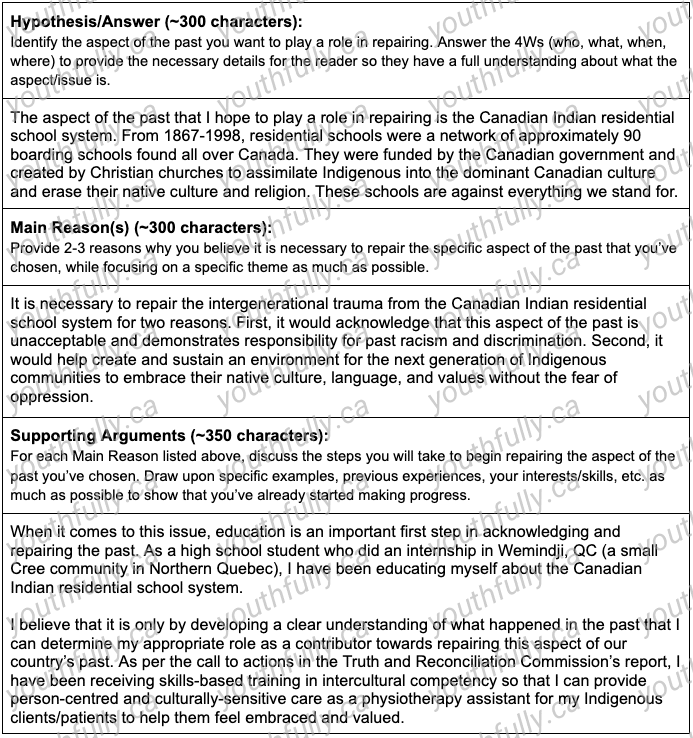
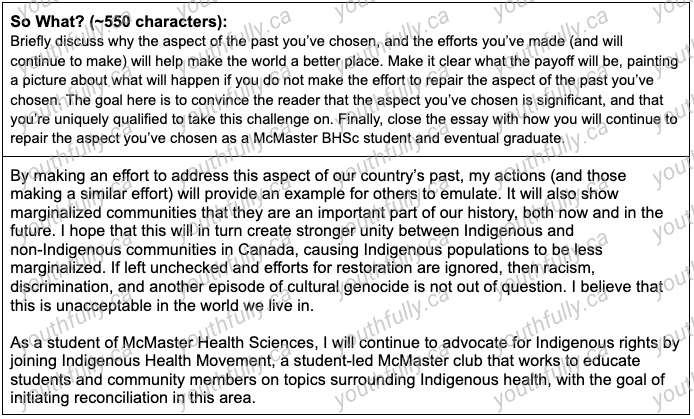
You Might Also Like
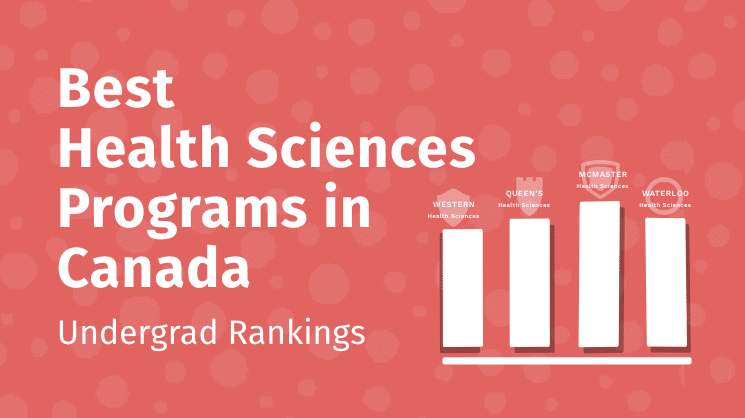
Rankings & Lists
Best Health Sciences Programs in Canada 2024 (Undergraduate)
You’re investing a TON of time, money, and energy towards your future. You’ve gotten the grades, done a bunch of… Read more
2023 McMaster Health Sciences Supplementary Application: Question 2, Option B
The World Health Organization (WHO) is an agency of the United Nations, aiming to provide global leadership in health, coordinating global responses to health threats, worldwide health promotion, setting international health standards, and more. There are nearly 70 WHO Teams, each of which is responsible for developing and implementing programs in a particular area. There are currently 12 WHO Teams seeking new Directors:
A recruiter has approached you to find out whether you would be interested in applying for one of these directorships. Your application must include a short proposal for what you would do if your Team was given $20 million* to use for a high-impact project. Which Team would you be interested in leading, and what would you propose to do with the $20 million?
McMaster Supplementary Application: Question 2B Breakdown
While this question might seem rather straightforward at first, it’s a bit more complex than you think.
The purpose of this question isn’t so you can randomly choose 1 of the 12 Teams and create an imaginary plan to spend the $20 million dollars. Instead, it’s asking you to provide personal insight, while assessing the causes and issues you value, what aspects of healthcare you’re interested in, what type of leader you are (and hope to become), and ways you want to make a difference in the world.
Put simply, it’s a way for the admissions committee to learn more about you, where you come from, and where you want to go.
With that being said, an important first step in answering this question is really taking the time to think about which Team you are going to choose. You don’t want to choose a Team out of thin air without being able to answer why you chose it.
Jot down a few things that are really important to you — those things that are inseparable from who you are as a person. For example, it could be your love of personal health and wellness, your obsession with computer software development, or your passion for finding ways to contribute to a global circular economy. Anything that has meaning in your life.
The Supp App reviewers are looking for a high level of self-awareness here, like what you’re most passionate about, how your experiences have informed or changed the things you value, and how you will pursue your goals in these areas in the future.
COACH’S TIP: If you have filled out your Student Identity Blueprint, it will be relatively easy to choose a Team based on your Values and the activities and experiences you’ve had (in the Extracurriculars & Initiatives section). If you haven’t done your Blueprint yet, click here to get started.
Next, have a look at the 12 Teams listed in the question and see which of those aligns with the points you’ve written down. The Team that aligns most with your values, interests, and long-term goals in the field of healthcare (both academically and professionally) is the Team that you should choose.
For example, say you want to apply to be the Director of the One Health Initiative because, during a summer project where you traveled to de-forested areas across the country, you realized that healthcare is so much more than what happens within the 4 walls of a hospital when you saw firsthand how our impact on the environment and wildlife negatively affects public health in the future. After that trip, you became passionate about finding new ways that people, animals and the environment can all work together to help make a healthier world and reduce the impact of human activity on climate change, conserve wildlife, and ultimately reduce the risk of disease threats long-term.
Now to the second part of the question. You’re told that your role as Director means that you’re responsible for ‘implementing programs in a particular area,’ and you must discuss what ‘high impact project’ you’d undertake with $20 million dollars.
Like you did when choosing a Team, think about your interests within the area you’ve chosen and look for gaps and needs in those areas.
A key term here is that the project has to be ‘high-impact’, meaning that its benefits will be felt on a global scale, it will address a current health crisis or need, it will change the state of healthcare or health standards for the better, etc. — think BIG here.
COACH’S TIP: When choosing a project, don’t simply pick a broad topic/cause out of thin air. You want your answer to be relevant and meaningful to today’s world. Do your research to learn more about current needs that actually exist in the world today, and then choose a project that aligns with your interests, experiences, and skills.
Then, you must create a mini-proposal, outlining exactly what you’d do with the money and what you hope to accomplish. It doesn’t have to be super in-depth (after all, the entire essay is 1,500 characters max), but you should try to make it as detailed as possible.
You want to provide an emotional AND logical analysis for this proposal. Appeal to the emotions of the reader by focusing on the urgency of the project and the impact it would have on people and the world. Then, focus on the logical side, like where exactly the money would go, how it would be divided, how you will evaluate the return on investment (ROI), and then you expect to see results.
Here are the key elements of an effective proposal to help get you started (think of this as the ‘logical’ part of the proposal mentioned above):
- Project Summary: A brief description of what this project is all about, answering the 5Ws (who, what, when, where, why).
- Project Description: What the problem, significance, objective, and anticipated outcomes of the project. Emphasize the urgency and severity of the problem. This also includes a description of long-term project plans. Emphasize the project goal, and what you hope to accomplish by doing it.
- Budget Explanation: A breakdown of where the money you are given will be divided and a justification for why you need the amount you’re given/asking for. Answer questions like: where would the world get the best return on investment (ROI) from the $20 million and when would you expect to see the results/return of the money you used?
COACH’S TIP: In your essay, you don’t necessarily have to go into detail about each of these things — just take the most important information from the above and include that. Even if you don’t include all the information you listed above, the admissions committee will be able to tell that you’ve really thought about your project proposal and put in the time to make it as comprehensive and ___ as possible.
Use the final part of your essay (we call this the ‘So What?’ section of our Deductive Communication Approach) to talk about why this project matters (this is the ‘emotional’ side we mentioned above). Emphasize the urgency of this project, and appeal to the human, empathetic side of your reader. You can use an experience in your life, talk about a common issue that exists in the world, or a current event that is negatively affecting people that you want to address.
Finally, you want to show why YOU are uniquely qualified to be the leader of the project, and how your experiences, leadership skills, etc. make you a perfect fit for what you’re proposing. Detail any ways you’ve already made progress toward fulfilling the goal of your project
Although this question is hypothetical and not a project you’re actually planning on doing, remember that the point of the question is to allow the app reviewers to learn more about you and see what’s important to you, while seeing your ability to think outside the box, do some research, and find ways that you can apply your experiences and skills to make a difference in the world.
If you need some help creating a memorable and unique essay that showcases your skills, interests, and experiences, connect with a coach for support.
McMaster Supplementary Application: Question 2B Template
Get started on your template here (click File > Make a Copy and save it to your computer).
REMEMBER: There is a 1,500 character limit for this question (including spaces and punctuation).
- Hypothesis/Answer (~200 characters)
- State the Team you would apply to be the Director of, as well as (very briefly) the project you would address with the $20 million dollars.
- Main Reason(s) (~300 characters)
- Provide 1-2 reasons about why you chose the Team you did. Draw on your interests, experiences, skills, and goals, providing specific examples as much as possible. Introduce the high-impact project you plan to work on as Director.
- Supporting Arguments (~550 characters)
- Provide some context about the project you hope to undertake, giving a brief project summary/description, including the problem, objectives, and anticipated outcomes of your project. Make sure to give enough detail about your project so that the reader feels as passionate about it as you do, and create an emotional connection with the reader wherever possible. Next, provide a brief breakdown of exactly how you plan to divide the $20 million dollars and justify why you need this amount of money to complete the project.
- So What? (~450 characters)
- Answer why this program is ‘high-impact’, stressing the urgency and need for it wherever possible and showing how you are uniquely qualified to be this project’s leader. Explain how this project will benefit people, improve healthcare and/or patient outcomes, and have a positive long-last effect on the world.
McMaster Supplementary Application: Question 2B Example
Here’s an example of an answer to this essay question.
REMEMBER: This is an EXAMPLE ONLY and is NOT meant for you to copy. Why? First and foremost, this is plagiarism and is a serious offense. Plagiarizing these essays will result in immediate disqualification from the admissions process. This can be easily detected using technology and application reviewers are usually trained and/or able to spot when an application isn’t original and does not align with an applicant’s background, personality, values, etc.
If you’d like support from a Youth Coach (including McMaster BHSc grads) to ethically help you come up with your own response to this essay, please reach out.
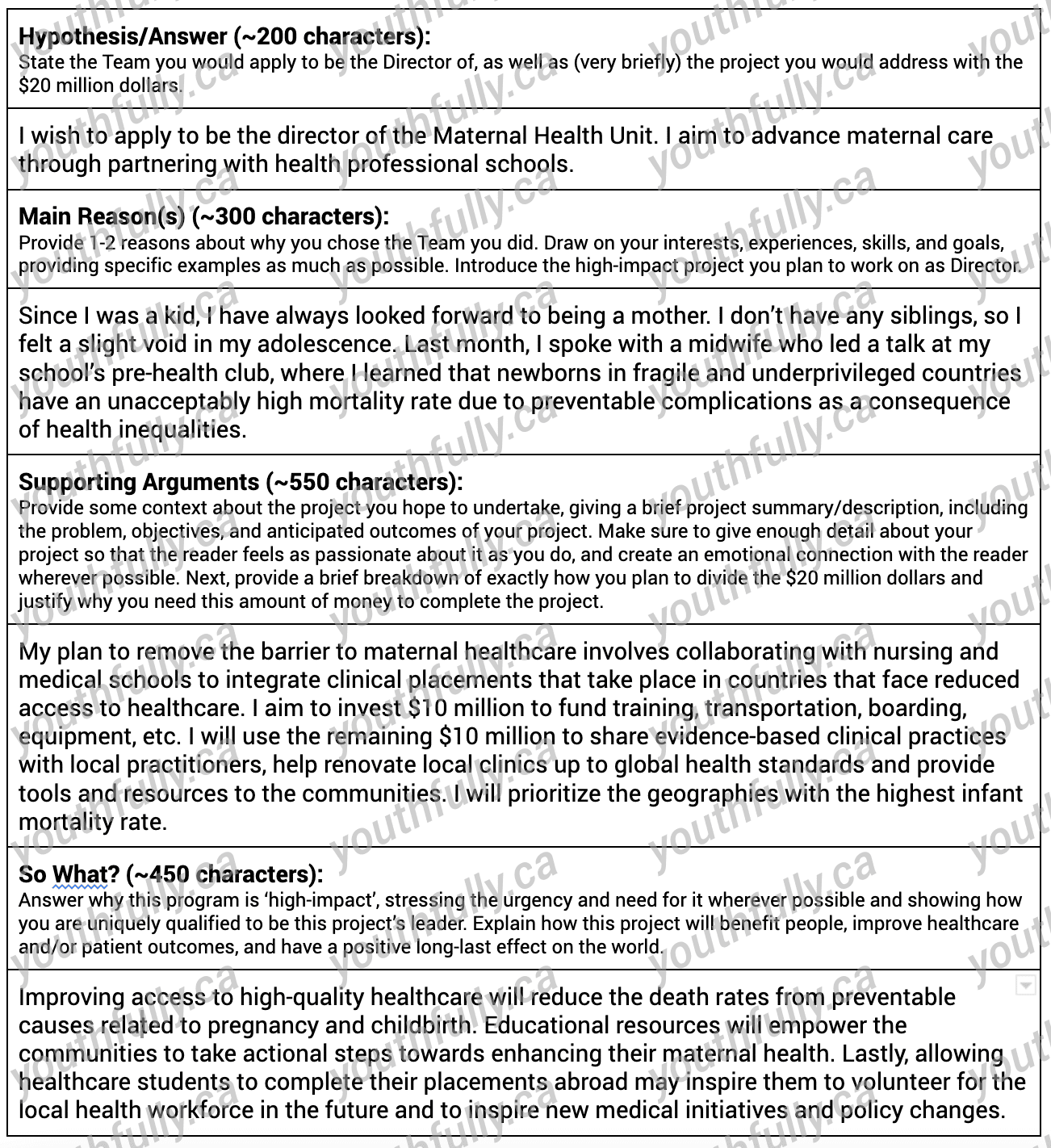
2023 McMaster Health Sciences Supplementary Application: Question 2, Option C
A University President has encouraged members of their university to get involved in the community and transfer the fruits of their scholarship from the so-called ‘ivory tower’ to the messy world. In response, a consortium of professors with diverse talents and expertise proposed a project that would develop a novel concept for an eclectic restaurant in a culturally diverse modern city. The team of neuroscientists, psychologists, chemists, engineers, anthropologists, historians, and sociologists have joined with faculty from the business school to develop a restaurant concept they call Objective Structured Taste Enterprises (OSTEs). A menu has been developed for the OSTEs drawing on ancient and modern recipes from many different cultures, and applying contemporary science from molecular gastronomy, food science, and the physiology of taste.
To evaluate the success of the project, the consortium wanted to develop an indicator that would capture more than just financial success. They developed a new index that they call the $ucCess Index ($CI) that incorporates information about sales along with patterns of selection from the menu, staff morale, customer ratings of the dishes, and number of return customers. The $CI was evaluated and found to be a reliable and valid indicator of performance based on these priorities.
A year ago, they opened 5 OSTE locations in different parts of the city, and now they are launching a task force to gauge the success of the project so far. You have agreed to lead this task force, and your first meeting with the group is next week. You have been provided with the Quarterly $CI scores for each location (see below), and asked to set an agenda for the discussion. Considering the project’s goals and the $CI data, what 3 questions will you prioritize for discussion at the first meeting?
McMaster Health Sciences Supplementary Application: Question 2C – Breakdown
Before you even read this prompt, you might immediately get overwhelmed by how long and detailed it is. Do not fear! A detailed and dense prompt can be a good thing if you are able to dissect it thoroughly and reflect your analysis and thoughtfulness in your essay answer.
This is contrary to the more open-ended essay prompts (e.g., one of the 2014-15 Mac BHSc prompts was literally “Why?”) that we’ve seen over the years, which provides less structure and guidance on what the admissions committee (adcom) may be looking for in an essay.
Anyway, back to the prompt! Why has the adcom developed and chosen this question as an option? There are several answers, but here are three:
1. On a more general note, the adcom uses prompts with data to learn your approach to, and depth of, critical thinking and problem solving, which are critical skills to excel in the BHSc program–but also in practically every professional sector.
2. There is a subtle element of teamwork and collaboration in this question as you are the leader of the Objective Structured Taste Enterprises (OSTEs) project evaluation task force. Given this, the adcom may want to understand your philosophy of teamwork and collaboration to assess whether it aligns well with their own. Don’t know Mac BHSc’s philosophy of teamwork/collaboration? Check out their website to find out!
3. There are also elements of creativity in this prompt– for example, the description of how the menu for the OSTEs were developed (i.e., “drawing on ancient and modern recipes from many different cultures and applying contemporary science”) and the way the new index (i.e., $uCess Index) is worded. With that said, it may be that the adcom welcomes a creative essay response that is appropriately balanced with thoughtful critical thinking based on the presented data of the $CI scores.
Now that we have several ideas as to why the adcom chose this question and what they might be looking for in a great essay, let’s breakdown several key excerpts of the prompt:
“A University President has encouraged members of their university to get involved in the community and transfer the fruits of their scholarship from the so-called ‘ivory tower’ to the messy world.”
As a Mac BHSc grad, this first sentence reminds me of HTH SCI 4X03, which was one of our mandatory courses that spanned the entire program. This course encouraged students to engage with the community in ways that align with their values and those of the BHSc program. Therefore, you can think of this “University President” as the Head of the Mac BHSc program, and the “members” as BHSc students. Keep this in mind as you read the rest of the prompt.
“…a project that would develop a novel concept for an eclectic restaurant in a culturally diverse modern city.”
When I read this excerpt, I immediately think about downtown Toronto–a city that exemplifies a mosaic of diverse cultures and populations. I highlight this
excerpt as it is an example of the importance of visualizing the prompt in your mind as you read and break it down.
“The team of neuroscientists, psychologists, chemists, engineers, anthropologists, historians, and sociologists have joined with faculty from the business school to develop a restaurant concept they call Objective Structured Taste Enterprises (OSTEs).”
This sentence is KEY! This is because: 1) it clearly lays out the backgrounds of the members of the OSTE team (which *hint, hint* can help inform what questions you choose to prioritize in this “first meeting”), and 2) introduces the key concept of OSTEs. Let’s further do a breakdown of this concept:
· Objective: If something is objective, it is not biased by personal feelings or opinions.
· Structured: If something is structured, it has a level of organization and planning to it.
· Taste: This makes sense as the OSTE is a “restaurant concept”
· Enterprises: This characterizes the restaurant concept as a business model, a concept that requires effort, or both!
All in all, the concept of OSTE appears to be an unbiased and organized business model aimed to establish successful restaurants.
On the note of success, the subsequent paragraph introduces the idea of project evaluation:
“To evaluate the success of the project, the consortium […] developed […] the $ucCess Index ($CI) that incorporates information about sales along with patterns of selection from the menu, staff morale, customer ratings of the dishes, and number of return customers.”
The paragraph that introduces the $CI essentially highlights the fact that the project team views success in a holistic manner as opposed to a one-dimensional way (i.e., simply identifying the financial success of the OSTE locations). Note: Remember the elements (e.g., patterns of selection from the menu, staff morale, customer ratings of the dishes, etc.) that contribute to the $CI index when you get to the table of $CI scores and try to interpret it!
“You have agreed to lead this task force, and your first meeting with the group is next week. You have been provided with the Quarterly $CI scores for each location (see below) and asked to set an agenda for the discussion.”
This excerpt introduces your role and responsibilities in the context of this prompt, namely, to lead the task force and to set an agenda for the first meeting. By the way, what is a task force? Basically, it is a group of members that are specifically ‘tasked’ to accomplish a particular goal, and in the context of this prompt, it is to evaluate the success of the project. Furthermore, think about any past leadership experiences when you took on the opportunity to lead/facilitate a meeting. How was that experience? Did you create and share an agenda before the meeting? Reflect on these experiences as they may help guide and personalize your essay response!
“Considering the project’s goals and the $CI data, what 3 questions will you prioritize for discussion at the first meeting?”
Ah, we finally get to the end of the prompt! This last sentence is key as it provides you with a specific task to guide your response. In other words, the bulk of your response will clearly state your 3 questions with justification as to why you have prioritized them. It is important that your choice of questions is informed by 1) the project’s goals (i.e., to develop a novel concept for an eclectic restaurant & to evaluate its success beyond financial measures) and 2) the data in the table that concludes the prompt:
The following are some points to consider when interpreting the table data:
· Is there meaning to the OSTE location names? Perhaps they reflect the unique cultural cuisine of each OSTE location.
· Are there any trends in the data from the first to fourth quarter? What might explain your observations?
· Which OSTE location has the highest $CI score in each quarter, and why might this be?
· How will the $CI scores and your interpretation of the trends influence what questions you ask?
After considering the prompt and the $CI scores, you might have generated a long list of questions. Here’s where the concept of priority is key. It’s important to define what factors influence the level of priority of a question. Some ideas include the following:
· Urgency in terms of decision making/meeting a deadline at the first meeting
· Answering which question will have the greatest impact on reaching the project’s goals?
· To what extent is the question helpful to further interpret the quarterly data?
Overall, this essay prompt is your chance to showcase your ability to think critically and creatively, as well as to make decisions (i.e., about which questions to prioritize) in a leadership context that is not too far from what students are exposed to in the Mac BHSc program.
McMaster Supplementary Application: Question 2C Template
Get started on your template here (click File > Make a Copy and save it to your computer).
REMEMBER: There is a 1,500 character limit for this question (including spaces and punctuation).
- Hypothesis/Answer (~200 characters)
- Clearly and concisely state the three questions you will prioritize for discussion at the first meeting.
- Main Reason(s) (~300 characters)
- Explain the main reason(s) why these are the three questions that you believe have highest priority. Simply list a main reason for each factor, or if 2-3 of the factors connect with a common theme, you can address it this way. Reflect very deeply about these factors to ensure they are unique to you in some way.
- Supporting Arguments (~550 characters)
- Support the main reasons you stated above. Support can be based on the details in the prompt, the $CI scores, the project goals, and/or your personal and relevant leadership experiences.
- So What? (~450 characters)
- Relate your 3 questions, main reasons, and supporting arguments all together by stating how the outcome of the first meeting will lead your task force one step forward towards evaluating the project’s success.
McMaster Supplementary Application: Question 2C Example
Here’s an example of an answer to this essay question.
REMEMBER: This is an EXAMPLE ONLY and is NOT meant for you to copy. Why? First and foremost, this is plagiarism and is a serious offense. Plagiarizing these essays will result in immediate disqualification from the admissions process. This can be easily detected using technology and application reviewers are usually trained and/or able to spot when an application isn’t original and does not align with an applicant’s background, personality, values, etc.
If you’d like support from a Youth Coach (including McMaster BHSc grads) to ethically help you come up with your own response to this essay, please reach out.
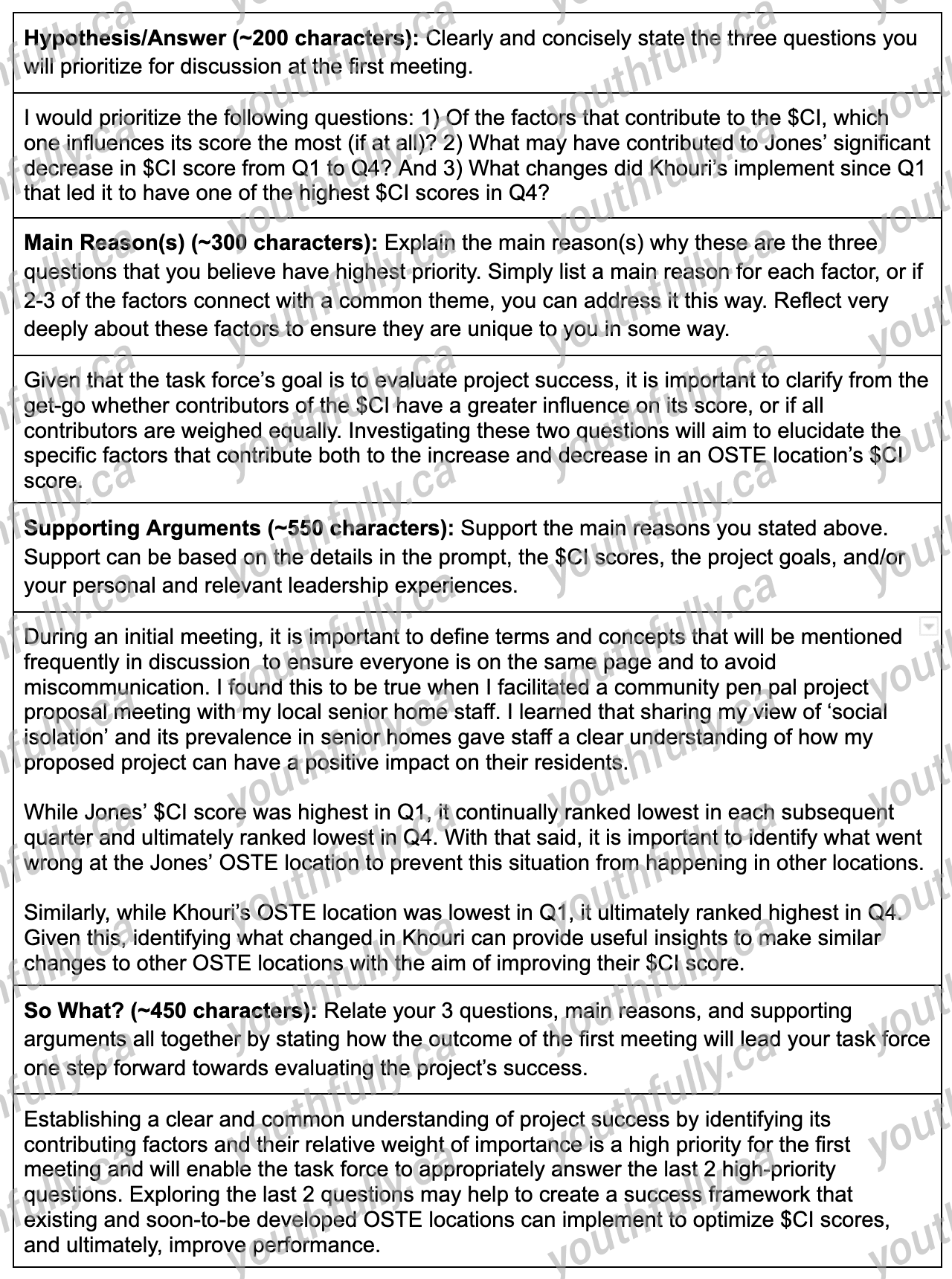
Ace your McMaster BHSc Supp App.
get a youth coach™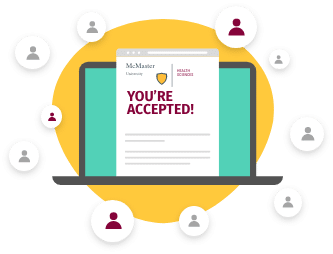
McMaster Health Sciences Supplementary Application 2022
This year’s application for McMaster Health Sciences can be found here.
For each question, applicants may choose between three options (A, B, or C) for two answers total.
McMaster Health Sciences Supplementary Application: Question 1
McMaster Health Sciences Supplementary Application Examples – Question 1A
1977 Chemistry Nobel Prize -winner Ilya Prigogine said, “The future is uncertain…but this uncertainty is at the very heart of human creativity.” The COVID-19 pandemic has given us all profound lessons at living with uncertainty and being creative. What is something that has changed during the pandemic that you think should continue afterward? How do you think the ‘new normal’ after COVID-19 should be different from the ‘old’?
McMaster Health Sciences Supplementary Application: Question 1A – Breakdown
Have you seen the movie The Butterfly Effect (2004) with Ashton Kutcher?
It’s a bit of a disturbing movie, but it highlights the concept of ‘chaos theory‘, which Prigogine co-developed.
What’s chaos theory? Essentially, it means that one small change in conditions can lead to unpredictable variation in the future state of a system. For example, if you go to McMaster BHSc rather than U of T to study Health Sciences, your life will take a different course than it would if you chose U of T.
Ilya Prigogine co-authored a book called The End of Certainty, and is most widely known for his view that no events in the world can be perfectly determined, meaning that there is always a level of probability attached to every event. Think of it like the predictions on the Weather Channel. Meteorologists might predict that it will rain tomorrow, but often times they are wrong and the day ends up being sunny and nice. This is because nothing can be determined with 100% certainty. Here’s a video that summarizes some of Prigogine’s views.
Question 1A is an opportunity for you to think creatively and come up with an answer that most other people wouldn’t. Avoid stating an obvious outcome from COVID-19, such as “it made the world much more sanitary”, “it improved our vaccine approval process”, or “it reduced greenhouse gasses in the world.” Only use these if there’s an authentic personal connection.
Instead, think about what you would never have expected the pandemic to influence. Choose a topic that allows you to give personal insight about who you are.
For example, if you listened to a lot of podcasts throughout the pandemic, you could argue this made you (and others) a better listener—then describe a real example of how this has played out in your life.
Or, if you’re passionate about women’s issues, you could talk about how the countries with female leaders had better success navigating COVID-19. Will this help more women be in charge through future crises? Could this help reduce the gender inequity gap?
Coming up with unique answers that draw on deep learning and insight will not only give the reviewers some background about who you are and what you value, but it will show them that you are a good critical thinker, problem solver, and communicator.
If you need help with this question and finding ways to incorporate personal insight and unique learning, connect with a coach now.
McMaster Health Sciences Supplementary Application: Question 1A – Template
Get started on your template here (click File > Make a Copy within the doc).
Question 1 is very personal, which is why we suggest using the Narrative Communication Approach™ in your response, so you can create a memorable and unique story.
This is a two-component question, so make sure you answer both components:
- What is something that has changed during the pandemic you think you should continue?
- How do you think post-pandemic should be different from the old?
- Part 1: Hook– Optional (~100 characters)
- Capture the reader’s attention and give a preview of what’s to come.
- Part 2: Context (~300 characters)
- Describe how things worked pre-pandemic in the area you’re going to focus your essay on. Give a personal example or perspective that really resonates with you.
- Part 3: Catalyst (~500 characters)
- Highlight the change that was catalyzed because of the conditions of the pandemic. Make sure you clearly answer this. Then, elaborate about what happened during the pandemic at a macro level (global) and a micro level (personal) as it relates to the issue you’re discussing.
- Part 4:Outcome (~400 characters)
- Describe, in detail, how you think the post-pandemic should continue, so we don’t simply reverse to pre-pandemic ways? Why would this be a good thing for society?
- Part 5: Reflection (~200 characters)
- Wrap it up by making a short statement that relates back to the theme of the question, “uncertainty and creativity”, and how that ties to you, your pursuit of science, and what you want to accomplish in the future.
McMaster Health Sciences Supplementary Application: Question 1A – Example
Here’s an essay example for this question.
REMEMBER: Please note that all of the examples in this guide are EXAMPLES ONLY and are NOT meant for you to copy.
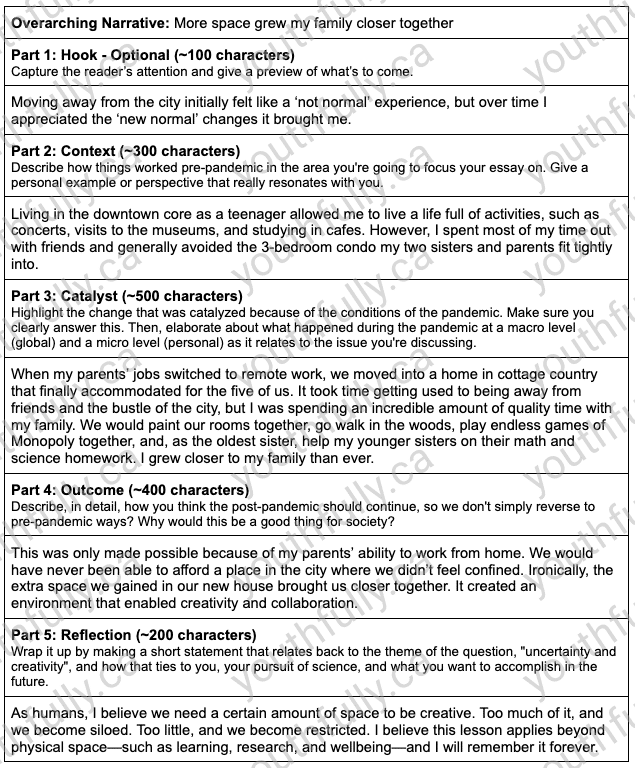
You Might Also Like
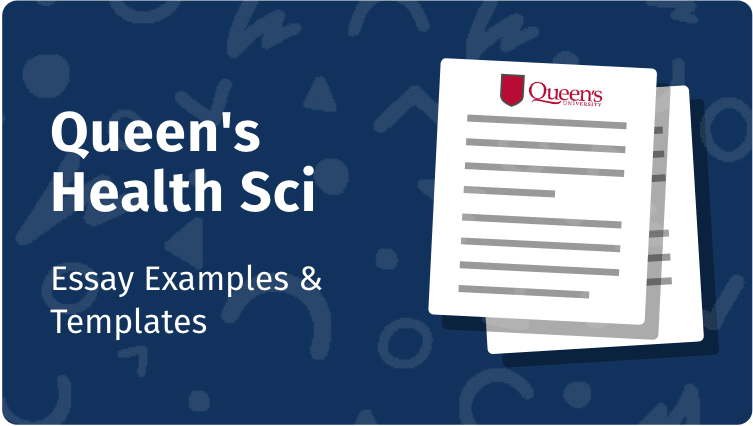
Application Prep
Queen’s Health Sciences: Supplementary Application Essay Examples & Templates 2023/2024
If you are looking for guidance on the Queen’s Health Sciences supplementary application, including application essay essay examples and templates,… Read more
McMaster Health Sciences Supplementary Application Examples – Question 1B
“You can’t always get what you want, but if you try, sometimes you might find you get what you need.” — Mick Jagger & Keith Richards (recorded by The Rolling Stones). Discuss.
McMaster Health Sciences Supplementary Application: Question 1B – Breakdown
You don’t have to have been alive in the 1960s to choose this essay question, but one thing that might be helpful to know is the same group sang a song called “I Can’t Get No Satisfaction”. Similar theme here.
Here’s an excerpt from American Songwriter that does a good job summarizing the meaning:
“Many of us go wildly awry in search of some personal achievement that is only bound to bring heartbreak. The chorus suggests that there is no shame in settling. If anything, it might be the path to true contentment.”
What does this mean? Essentially, going after big goals and not achieving them may not be a bad thing. You may have just saved yourself from a bad situation (and you likely learned a lesson from it).
When getting started on this question, think about a time when this song would really have resonated with you. Was there a specific goal you went after but it didn’t turn out like you thought? Did you experience failure (or success) and it wasn’t what you expected? Did you go through something that changed who you are as a person?
Our coaches encourage students to set Audacious Yet Authentic Goals™, because if they are just audacious, you’ll be left unsatisfied when you reach your goals. So, what goal did you pursue that wasn’t authentic?
In other words, what goal wasn’t ‘yours’. Maybe it was someone else’s, influenced by your parents, siblings, friends, society, etc. Maybe you just didn’t have enough of a grasp on what’s important to you and so you went after something you ‘thought’ was going to make you happy, but didn’t. Maybe you failed at pursuing a goal and you learned something significant?
It could even be about a goal you saw someone else pursuing, as long as you relate it back to you, so you can give the reader personal insight about who you are.
Either way, make sure it’s unique. If it isn’t, try to dig a little deeper so that story is more compelling than others. For example, if you spent 10 years pursuing RCM piano, it’s likely many high-achievers applying to McMaster BHSc did the same. You’ll see how we did this in the example below.
McMaster Health Sciences Supplementary Application: Question 1B – Template
Get started on your template here (click File > Make a Copy within the doc).
We recommend using the Narrative Communication Approach™ for this essay, so that it reads more like a story.
We suggest allocating a good portion of the essay to the final Reflection section of the narrative so you can really emphasize what you learned and the impact this experience had on you.
- Part 1: Hook– Optional (~100 characters)
- Capture the reader’s attention and give a preview of what’s to come.
- Part 2: Context (~300 characters)
- Paint the picture and set the scene about relevant details that would help give some colour to the story (i.e. your upbringing, when the story took place, etc.). This theme in this part should foreshadow the Reflection part.
- Part 3: Catalyst (~350 characters)
- Talk about the achievement you pursued, why, and what was involved. Give some specifics here and finish the paragraph with the result of your efforts (e.g. you reached the goal, you failed, you quit, etc.).
- Part 4:Outcome (~300 characters)
- Describe what happened afterwards. Don’t jump to the learning just yet, stick to how you felt after the result of the part before.
- Part 5: Reflection (~450 characters)
- This is where you respond to the “you might find what you need” part of the song. What did you learn about yourself or realize about the world through this pursuit? Why was the pursuit of your initial desire not right?
McMaster Health Sciences Supplementary Application: Question 1B – Example
This is a more unique spin on a common story: a student pursuing School Council Presidency.
REMEMBER: Please note that all of the examples in this guide are EXAMPLES ONLY and are NOT meant for you to copy.
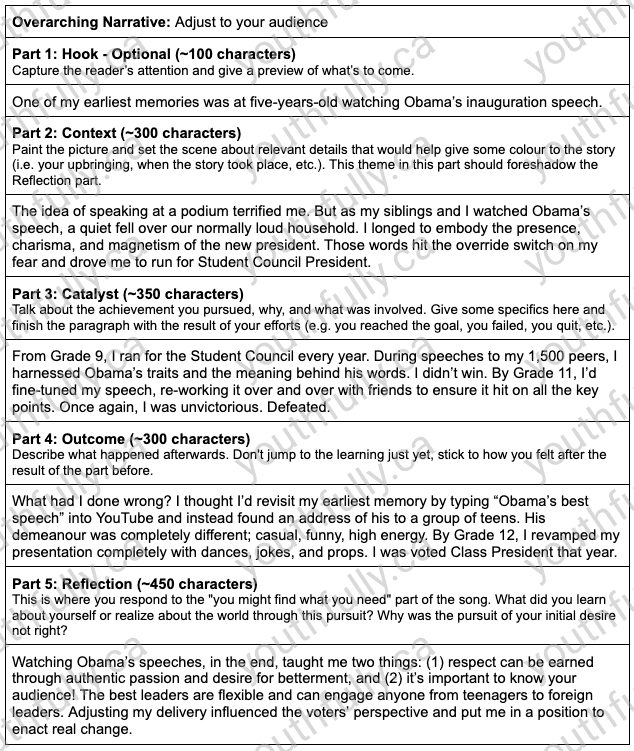
McMaster Health Sciences Supplementary Application Examples – Question 1C
American psychologist David Keirsey devised a personality typology, a contemporary interpretation of ancient Greek thinking on temperament. It consists of 4 main temperaments, each of which has 2 roles:
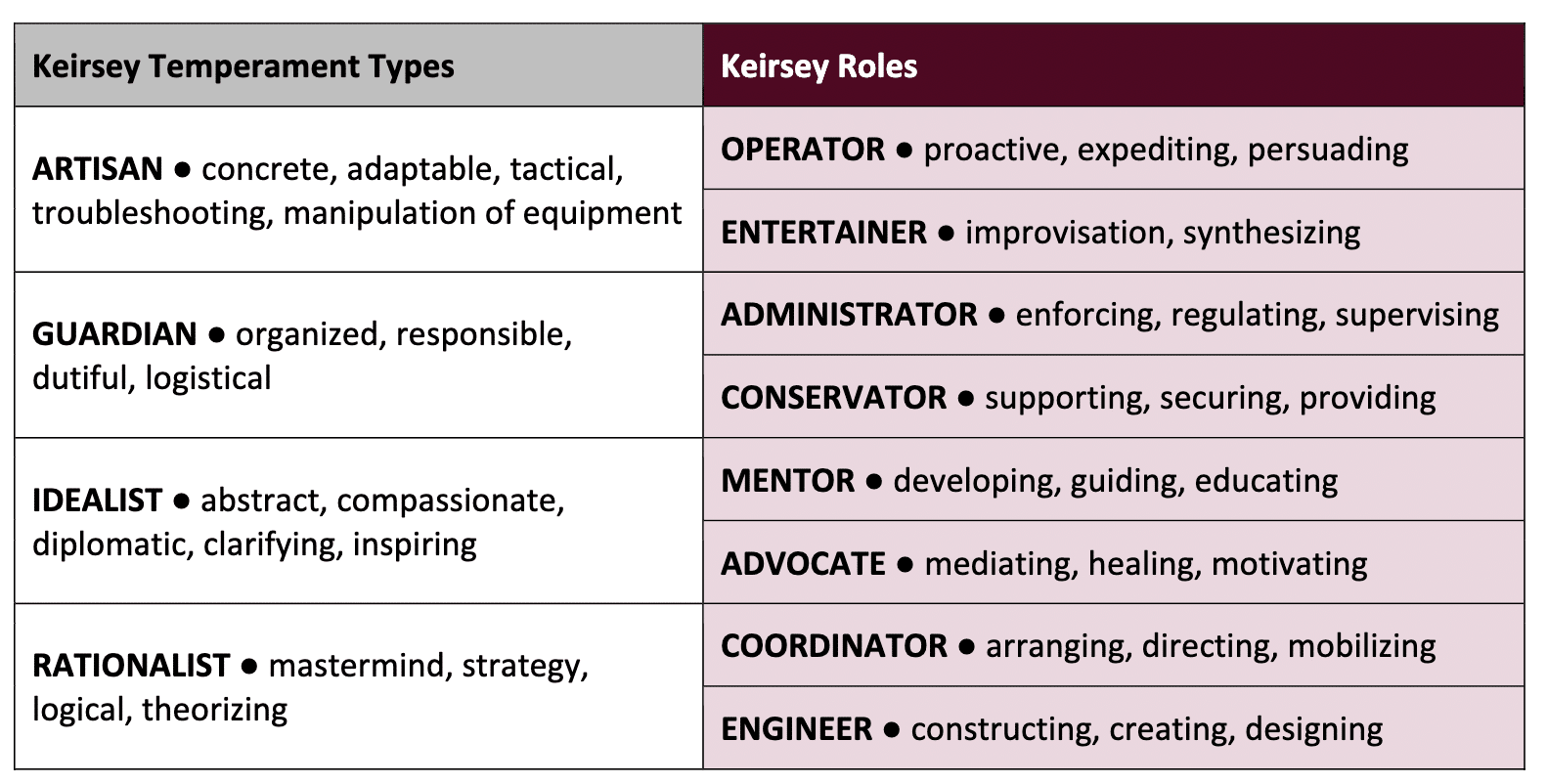
You have been selected as one member of a challenging 5-year space mission, and have been asked to recommend one preferred crewmate, based on how well they would complement your own strengths and weaknesses. Which of the 8 Keirsey Roles would you choose as your partner in order to optimize your chances for mission success, and why?
McMaster Health Sciences Supplementary Application: Question 1C – Breakdown
We love these types of questions because it gives our students who completed our Self-Awareness Student Assessment and Student Identity Blueprint™ a great chance to flex their self-awareness and really stand out from other applicants (and it’s also way easier for them to answer because they’ve basically done all the work beforehand!). If you haven’t completed your Blueprint, connect with a coach to get started on your own Blueprint.
In order to truly know the crewmate who would complement your strengths and weaknesses, you have to be self-aware about your own.
If you’re working with a coach, go back and visit your Blueprint, particularly the Skills and Susceptibilities sections, where you’ve articulated a statement for each of them. Use these statements in this essay.
You may be tempted, especially if you are a Rational type, to clarify what a “challenging 5-year space mission” exactly entails. We believe this was left intentionally vague for you to briefly share with the reader what success look like for you in this mission? Is it just survival? Exploration? Enjoyment? Maybe all of the above.
The best place to start with this essay is to decide what kind of challenging life experience do you want to share with the reader that best encapsulates your strengths and weaknesses. For example, maybe you play AAA hockey and your defence partner is the perfect complement to you. Check out the template in the next section to see how to incorporate a personal experience.
If you’re unsure which of the 16 roles you are, you can take a free test at 16personalities.com, which will give you a set of four letters. These four letters map to the 16 Keirsey Roles. For example, if you are an INTJ, Keirsey labels you a ‘Mastermind‘.
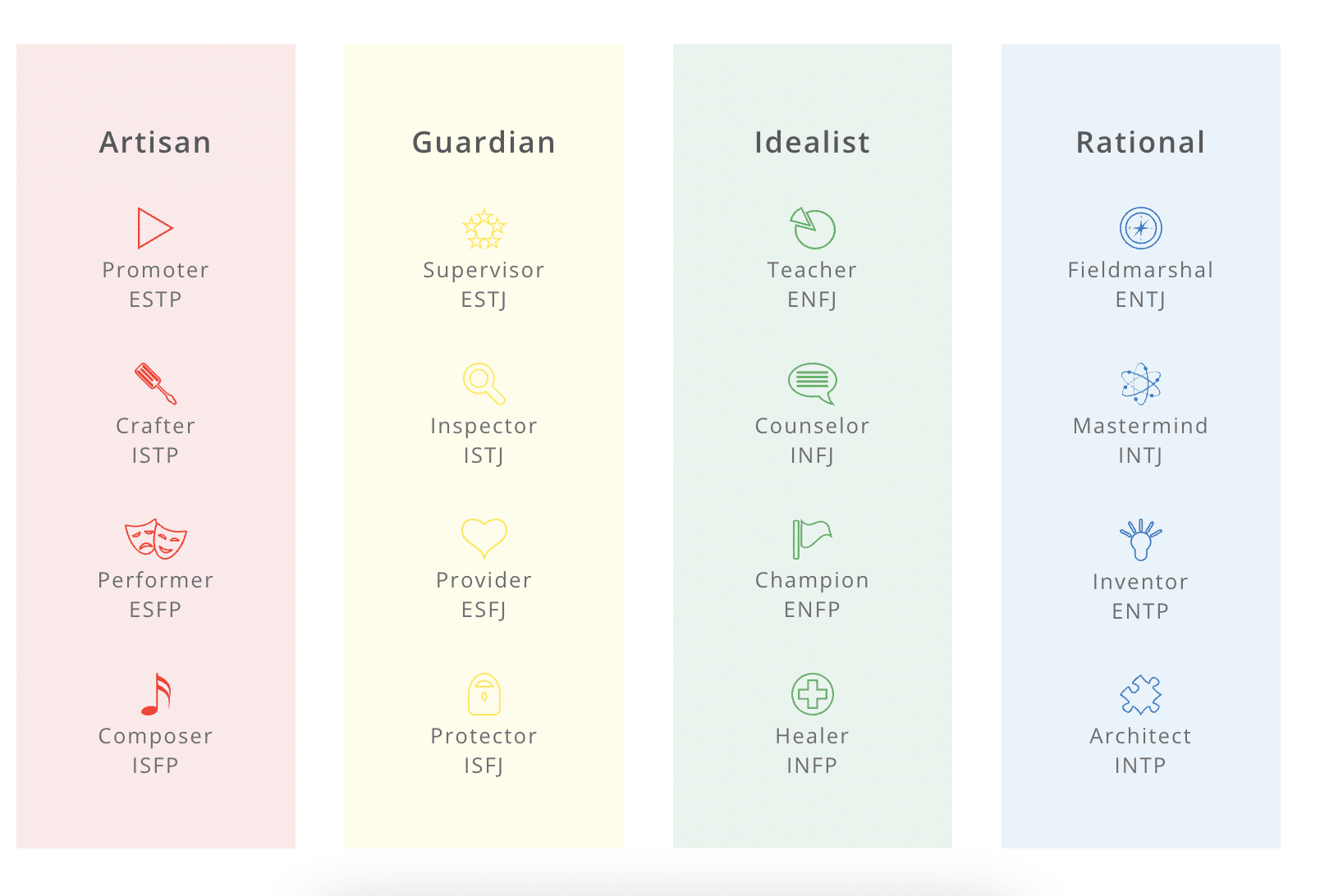
After you’ve read a bit more about yourself to understand your type better, the easiest way to find your perfect complement is to look at your opposite type. For example, if you’re an INTJ (Mastermind), your opposing types are simply the opposite sets of letters in your mix, in this case ESFP (Performer).
Here are the MBTI dichotomies to help you find a complement. Alternatively, the Natural Skills assessment from the Blueprint is based on MBTI, so you can also look at the skills you’re low in and map those to a Keirsey Role/MBTI role. If you need help doing so, reach out to your coach.
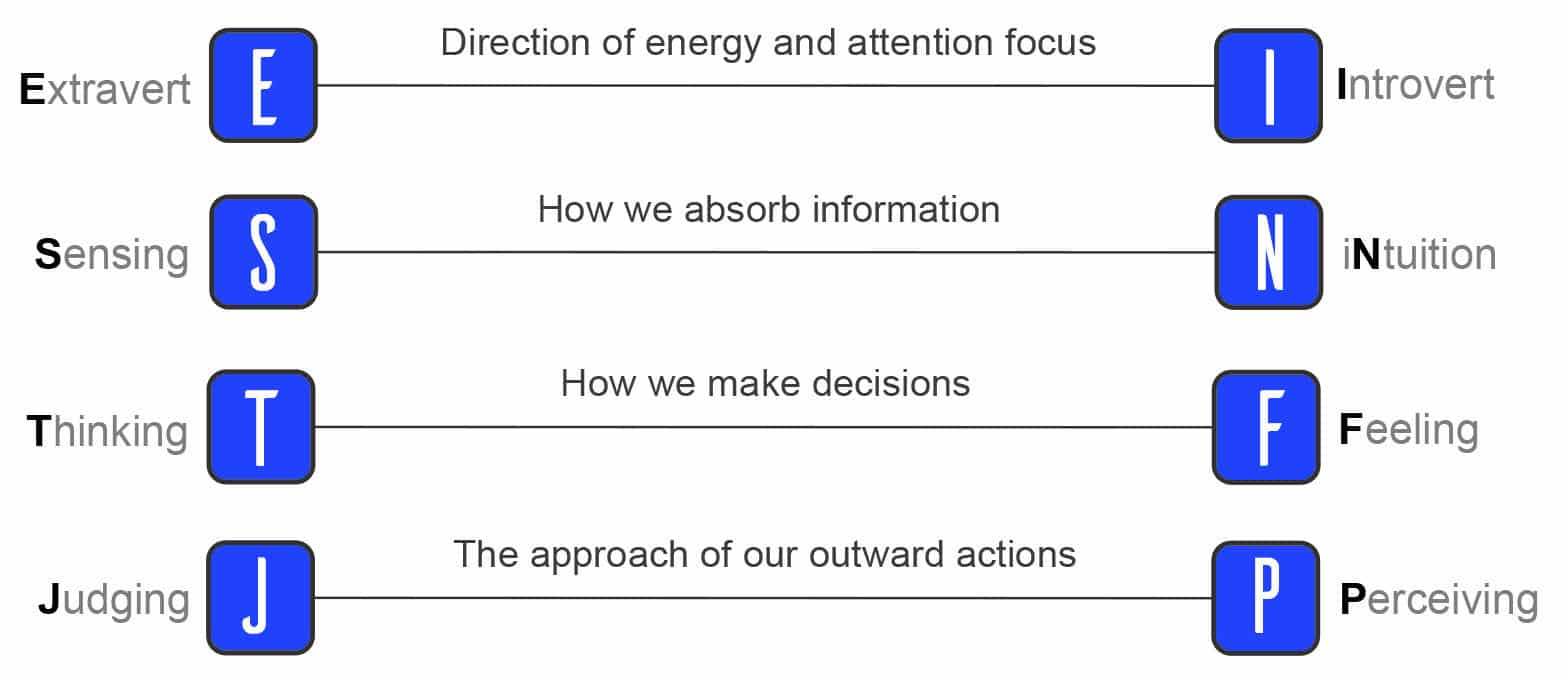
Your complementary crewmate doesn’t have to be perfectly opposite to you. For example, if you’re an INTJ, a good complement may also be a ISTJ, or a ENTP. Not every letter has to be completely different. It’s best to identify opposing types and read through the descriptions of these individuals to see which type best complements you.
You can also think about friends who you would want to be your crewmates, and ask them to take the 16personalities.com test, then map that to a Keirsey Role. Maybe you went through a challenging experience with someone and conquered it? That’s a great thing to incorporate for this essay.
What challenges would you expect to arise when it comes to this mission, because of your susceptibilities? For example, if you’re an ENFJ maybe you’re a really influential person, so when you land on an inhabited planet, you can sweet talk those aliens and get them to like you.
On the other hand, maybe you’re not so strong with hands-on tools and machinery. For example, if a crater knocked off one of your signals on your space shuttle, you wouldn’t be the best person to go out there and fix it.
Ideally, you want to relate this back to a real life experience that aligns. Maybe you helped build a home in Nicaragua for a local community, and when some of your materials were stolen, you had to influence friends back home to donate $500 to help pay for these materials.
McMaster Health Sciences Supplementary Application: Question 1C – Template
Get started on your template here (click File > Make a Copy within the doc).
We recommend using the Narrative Communication Approach™ for this essay, so that it reads more like a story.
As you can see, we allocated a lot of character space to Part 3, because we feel that’s the section the reader will be able to get a true understanding about you.
- Part 1: Hook– Optional (~100 characters)
- Capture the reader’s attention and give a preview of what’s to come.
- Part 2: Context (~300 characters)
- Describe your strengths and weaknesses very clearly and specifically, leveraging your Skills and Susceptibilities statements from your Blueprint. Identify your Keirsey role and the role that you would choose for your partner. Explain why.
- Part 3: Catalyst (~500 characters)
- Give some personal insight here, ideally describing a real life experience that further argues why this crewmate would be so essential to you (e.g. an extracurricular).
- Part 4:Outcome (~400 characters)
- Now relate this to the space mission and how it would play out with your crewmate. Get creative here.
- Part 5: Reflection (~200 characters)
- Reflect on the bigger picture, how would this kind of crewmate support you on your career journey, in your day-to-day, or in your time at university?
McMaster Health Sciences Supplementary Application: Question 1C – Example
This essay example may or may not have been inspired by real events 🙂
REMEMBER: Please note that all of the examples in this guide are EXAMPLES ONLY and are NOT meant for you to copy.
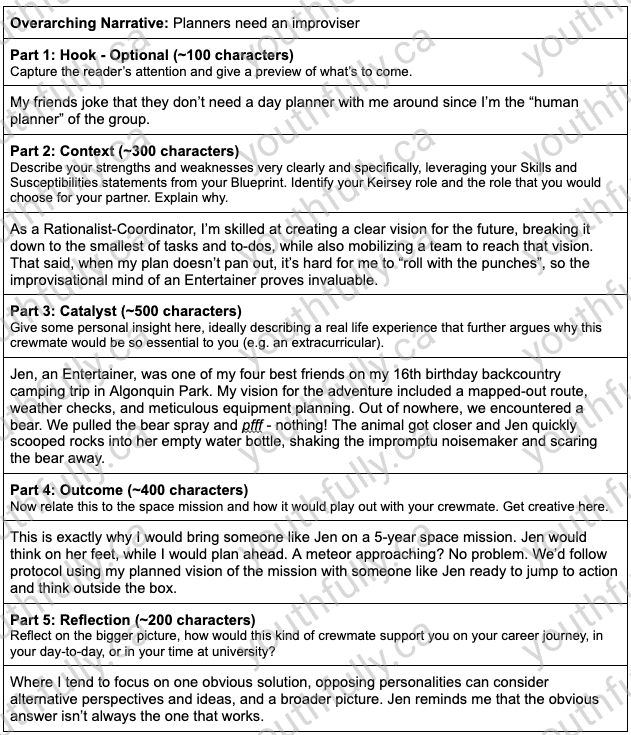
Find the mentor you’ve been looking for.
learn moreSimrit
McMaster BHSc
Grad & Youth
Coach™
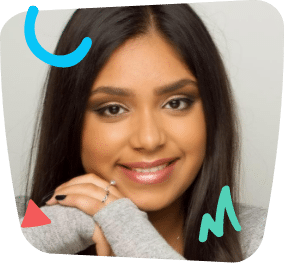
McMaster Health Sciences Supplementary Application: Question 2 – Overview
McMaster Health Sciences Supplementary Application Examples – Question 2A
You have been awarded a summer internship to join the research group of Dr. Uushig Ivili at the National University of Mejuputara, who studies how pollution influences the development of allergic diseases Dr. Ivili has recently begun doing work with a community in Edoforo City, a few kilometers south of the university, and has obtained data from the regional health authority about the number of people with physician-diagnosed asthma in each of 6 zones. She also has some initial air quality monitoring information for particulate air pollution in those zones – more pollutant data will be coming in a few weeks. She suggests that the analysis of this data could be your research project (see Figure 1).
Dr. Ivili reminds you that these are just the initial raw data – there are a number of things that need to be taken into account before you can really start to make sense of these numbers. She challenges you to take some time to think about this, and meet with her again in a couple of days with some ideas about what you think needs to be accounted for in analyzing and interpreting this data. Identify 3 factors that you think need to be considered in your analysis of the data that you’d bring back to your next meeting to discuss with Dr. Ivili, and explain why these are important.
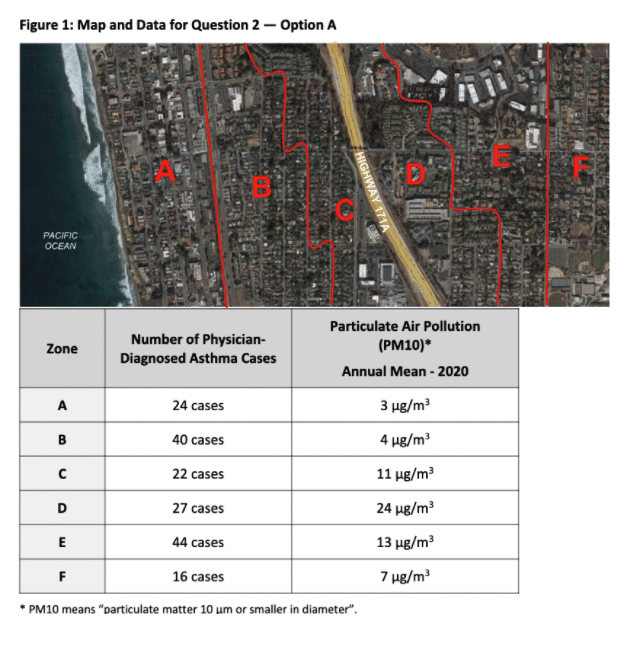
McMaster Health Sciences Supplementary Application: Question 2A – Breakdown
This is the typical analytical question that McMaster has asked in past years (see Question 3 from the 2020/2021 application below).
We know that the options in Question 2 can seem super complicated, but DON’T PANIC. Just read one sentence at a time and take time to think about what the question is asking. We’ll also give you some helpful pointers below. 🙂
The question is saying that a part of an internship internship opportunity could involve analyzing a group of air quality data. Here, you must identify three observations to improve this initial set of data.
Before answering the question, ask yourself a few things.
First, what do you think this research project is trying to solve? The obvious answer is researching a correlation between asthma diagnoses and air quality, but what else could be a purpose of this research?
We always recommend asking some initial questions so you can better understand and frame the problem.
For example, what does μg/m3 mean and are these numbers high or low versus other areas?
- After a quick Google search, the World Health Organization’s guideline value for PM10 is a 15 μg/m3 annual mean.
- What does this mean? It means that most of the numbers in this region are all below the levels of the WHO guideline, except for D.
- So what’s going on with D? Get creative because 99% of students will say its adjacency to the highway causes higher PM10.
- Zone A and B are very low, probably because they are close to the ocean (but look at the data to be sure of this).
- Zone F is also low, as it looks like it’s closer to a school with some parks.
Let’s look a little deeper at the highway theory with PM10 data. There appears to be a very high correlation (R value) between the PM10 and the distance towards the highway.
In other words, closer you get to the highway, the worse the air quality.
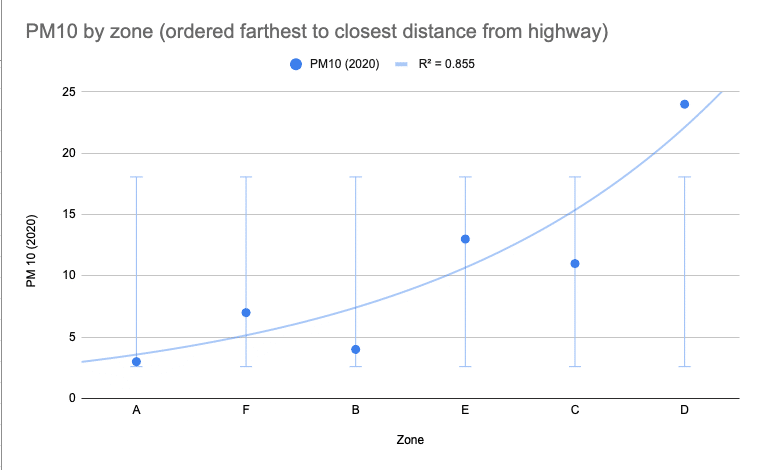
The other data point, number of physician-diagnosed asthma cases.
- What’s wrong with this data when you compare it to the PM10 data? We don’t want you to give you the answer here, so here’s a question for you: is the number of asthma cases and the PM10 in 2020 a like-for-like comparison?
- In other words, are these two variables in the same units so you can compare them properly?
- What are the problems or risks with using this data and comparing it against the PM10 data?
- There are multiple issues, but here’s a hint: if you were diagnosed with asthma from poor air quality, would that happen right away?
The last data point, even know it may not seem like one, is the zones.
- What’s wrong when you compare each zone against each other? Is this a like-for-like comparison? No, it’s not.
- Zones can be measured by the geographic size of the zone and the population of the zone. From looking at the map, both are inconsistent with one another.
- Read our essay example, where this is part of the theme of the essay.
We recommend talking this out with someone: a friend, teacher, parent, or Youth Coach.
McMaster Health Sciences Supplementary Application: Question 2A – Template
Get started on your template here (click File > Make a Copy within the doc).
We recommend using the Deductive Communication Approach™ for this essay.
The structure we recommend is finding a common theme/thread with at least two of the three factors, and then focus your essay on this.
You could also dedicate a paragraph to each factor then provide a reason/supporting argument for each factor. We’d recommend this approach if you had >2,000 characters, but with 1,500 characters, you are far too limited with this approach.
Here’s a structure that will help you create a standout essay:
- Part 1: Hypothesis/Answer (~150 characters)
- List the three ‘factors’ you think need to be considered in the analysis based on the initial set of data in order to improve this organization’s ability to study how pollution influences the development of allergic diseases, such as asthma.
- Part 2: Main Reason(s) (~450 characters)
- Explain the main reason(s) why these are the three factors that you feel need to be considered. You can simply list a main reason for each factor, or if 2-3 of the factors connect with a common theme, you can also address it this way. Think very deeply about these factors to ensure they are unique to you in some way.
- Part 3: Supporting Arguments(~550 characters)
- Explain the main reason(s) why these are the three factors that you feel need to be considered. You can simply list a main reason for each factor, or if 2-3 of the factors connect with a common theme, you can also address it this way. Think very deeply about these factors to ensure they are unique to you in
- Part 5:So What? (~350 characters)
- Relate it back to the overarching purpose/goal of this study (in your opinion) and why looking at these factors will not only support this, but also help guide the future of this research in the right direction.
McMaster Health Sciences Supplementary Application: Question 2A – Example
We took a bit of a different approach on this essay, focusing on the zoning variable rather than the PM10 or asthma cases data, because there are going to be a lot of the same responses in this essay.
REMEMBER: Please note that all of the examples in this guide are EXAMPLES ONLY and are NOT meant for you to copy.
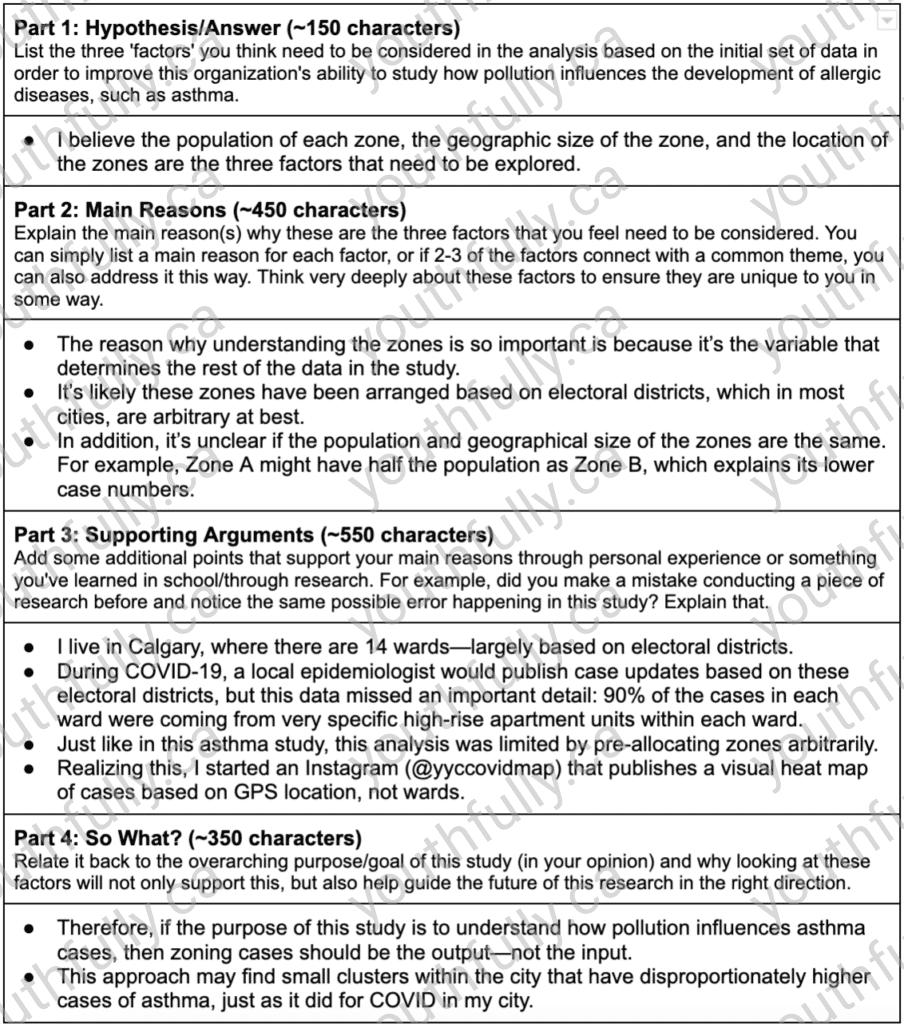
McMaster Health Sciences Supplementary Application Examples – Question 2B
Design an experiment that attempts to determine whether a class of students has learned enough of something. Provide the rationale for your design, and explain your reasons for setting up the experiment as you did.
McMaster Health Sciences Supplementary Application: Question 2B – Breakdown
This question offers a lot more room for creativity, but because of this more applicants will likely choose it.
Don’t let that stop you from picking this question though! If you do choose it though, think very deeply about it to ensure your response is highly differentiated and unique.
Reviewers want to see that you have a logical process experiment design, but also creativity and personal insight within that process.
Let’s start by defining the problem: What is the best experiment to run to evaluate if a class has achieved its desired learning outcome?
Some people may interpret this as, “Design an experiment that can be used to evaluate learning achievement for any class.” However, that gives much less room for creativity and personal insight.
To make it a bit more interesting, imagine you could choose to attend any class in the world (even fictitious) and then write a review after, or that you were the instructor of this class and had to evaluate its effectiveness with your students.
Making it more personal offers the reader a bit of background into who you are.
Follow these steps to brainstorm a strong response:
Step 1: Define your class
The details of what this class is about are left intentionally vague.
This is an opportunity for you to design your own response. Here are some prompts to help you:
- What is the class about? Choose something you’re genuinely passionate about. (e.g. biology, goal-setting, robots, salsa dancing, chess)
- What were the students supposed to learn? This could be something very quantitative and easy-to-measure or something less tangible (e.g. confidence)
Step 2: Define your question
Next step is to develop a question for your experiment. For example, “Can Millennials, born 1981-1996, learn ‘the floss’ dance move in a 5-minute audio-only course?”
The following prompts will help you define your own question:
- When was the class versus when are you evaluating? (e.g. a year after the class finished, a day after, a decade after)
- How long was the class? (e.g. one hour, one day, one year, one decade)
- What methods were used in the class to teach the topic/skill? (e.g. case studies, group projects, experiential activities)
- How many students are in your class? This will greatly impact your experiment. (e.g. 5, 500, 5000)
- Who is the class for? (e.g. anyone, kids, elderly, women, dog owners, people with amaxophobia)
- What is the delivery channel of your class? (e.g. virtual live, in-person, virtual asynchronous, blended)
Step 3: Design the experiment
When designing your experiment, you don’t need to structure it exactly how a scientist would. That would be very boring for the reader.
However, it’s helpful to incorporate some important components of experiment design, so you can demonstrate your comprehension of the best-practice experiment design methodology.
If you’re unfamiliar with this methodology, check out this video from the Khan Academy. The experiment you’re running is very different than a traditional science experiment, so don’t get too caught up in the methodology.
Again, you just want to demonstrate your ability to think like a scientist.
For example, you could mention your awareness of different variables that could influence the result of the experiment (e.g. prior knowledge of dancing, the use of music during the evaluation, etc.). You could also mention you may have two groups within your experiment to control these variables.
If you need some help deciding how to approach this question, connect with a coach.
McMaster Health Sciences Supplementary Application: Question 2B – Template
Get started on your template here (click File > Make a Copy within the doc).
We recommend using the Deductive Communication Approach™ for this essay.
This is just one possible essay structure. There are other structures that could be used depending on your approach and writing style, so don’t feel constrained that your answer must fall within this template.
- Part 1: Hypothesis/Answer (~150 characters)
- State the overarching question of your experiment, then state your hypothesis.
- Part 2: Main Reason(s) (~450 characters)
- Describe the relevant details of the class and the learning outcome you are measuring. Don’t explain the experiment yet. That comes in the next section.
- Part 3: Supporting Arguments (~600 characters)
- Explain the experiment, the rationale for your design, and reasons for setting up the experiment as you did. If you can add a personal touch here, that would be great.
- Part 4:So What? (~300 characters)
- Give some personal insight into the importance of this experiment by relating it back to you, your personality, your life experience, or something that is meaningful to you.
McMaster Health Sciences Supplementary Application: Question 2B – Example
The important thing to remember for this essay is that you will not be able to explain a perfect experiment in 1,500 characters.
There will be flaws in your experiment and that’s okay. It’s better if your essay is unique and original, while also demonstrating some ability to think like a scientist.
Here are a couple other topic ideas that come to mind:
- Evaluating someone’s integrity by playing board games
- Evaluate someone’s cooking through a 100-person blindfolded meal
- Evaluate resilience by setting up activities that will fail for participants
- Evaluate creativity with the brick game
This essay example is inspired by this hilarious TED Talk.
REMEMBER: Please note that all of the examples in this guide are EXAMPLES ONLY and are NOT meant for you to copy.
If you’d like ethical support, reach out to a Youth Coach who will challenge your thinking, elevate your writing abilities, and empower you to write the best response you can.
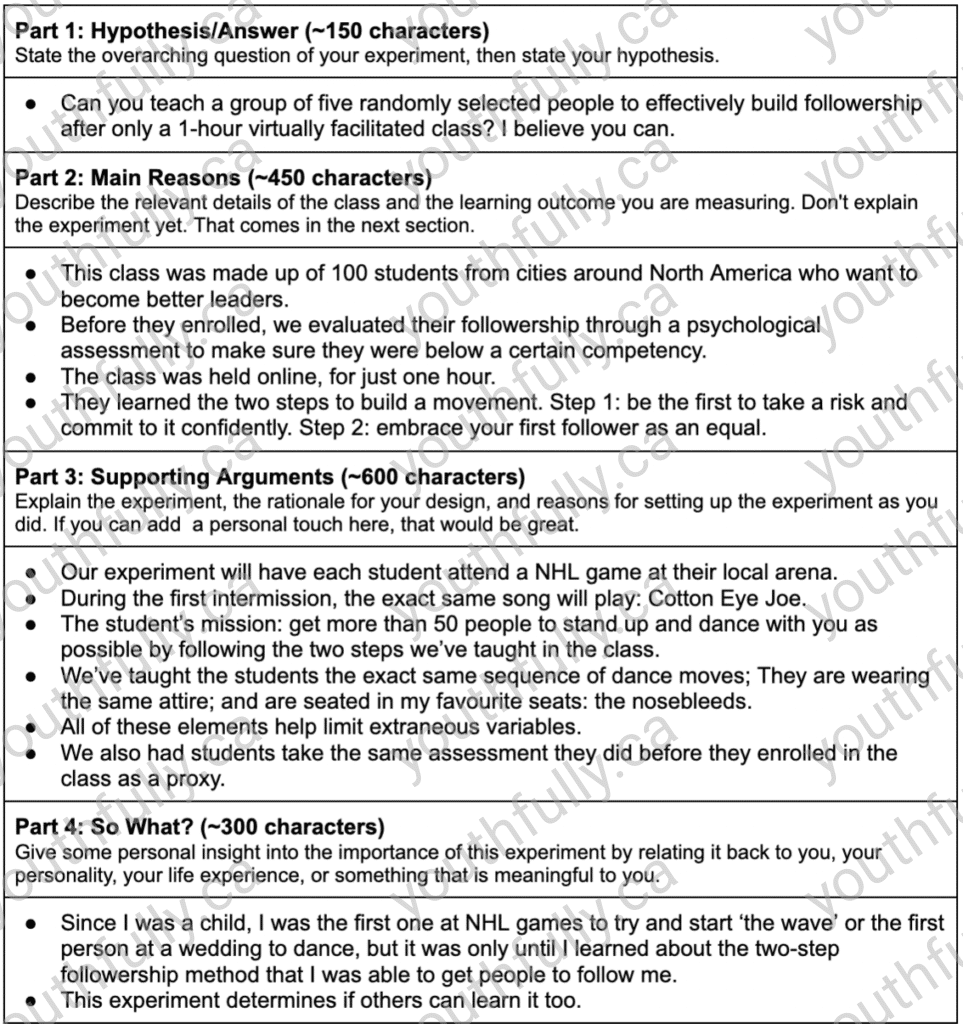
You Might Also Like
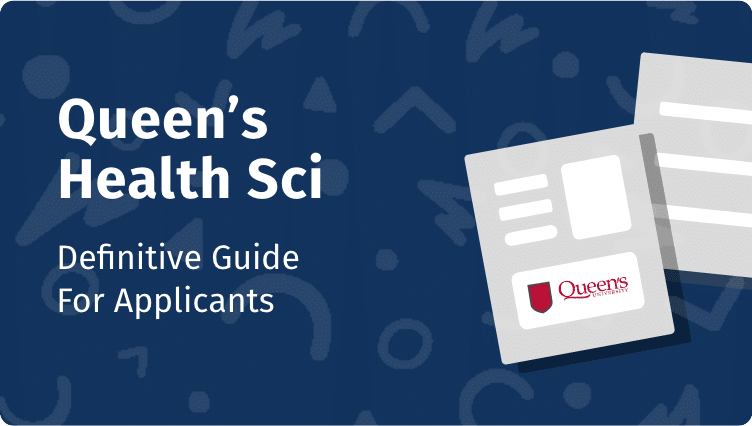
Program Guide
Queens Health Sciences: The Definitive Guide for Applicants (2024)
If you’re applying to Queen’s University for the Bachelor of Health Sciences (BHSc), or you’re simply interested in learning more… Read more
McMaster Health Sciences Supplementary Application Examples – Question 2C
After the confirmation that a mass grave was located at the Kamloops Residential School, leaders of the Indigenous Health Learning Lodge in the Faculty of Health Sciences at McMaster issued an open letter to the community, including the following paragraph:
“There are many more truths about our lives, our ways, our customs and beliefs and our knowledge systems. We can’t demand belief about these truths but we can ask for respect and pedagogical space without the ever-present demand for western based ‘evidence’. As the university aspires to a more inclusive learning environment, this respect for pluralism will have to be reckoned with.”
In your view, how can we take a more pluralistic view of knowledge and evidence in the health sciences?
McMaster Health Sciences Supplementary Application: Question 2C – Breakdown
This question is a bit complex, so we’ve broken it down into 3 steps so you can go through it logically and understand all the different components better.
Step 1: Deduction
First of all, we recommend educating yourself on the issue through your own independent research. We also recommend reading about the Indigenous Health Learning Lodge and the full letter published.
After reading, reflect on this question: Is the scientific method black and white? Or does the field of health sciences leave room for interpretation, differing perspectives, and lateral thinking?
What do we mean by this? Here’s an example.
In medical school, students are taught that what you eat doesn’t impact skin disorders, such as psoriasis or acne.
Dermatologists will simply prescribe topical creams or harsh medications to treat the issue.
But other forms of medicine, such as naturopathic medicine (combining modern and traditional forms), find a link between things like gluten, sugar, and dairy and skin disorders.
Chinese Medicine have different theories as well.
Taking all of these into account is a pluralistic view.
Consider the question from a broader perspective. How has either Western-focused education or pluralistic approaches affected your entire educational experience?
Reviewers will want to see that you’ve given both views on knowledge and evidence (Western-based evidence & pluralism) some thought.
Decolonizing academia (and science specifically) begins with:
- An understanding of the harm inflicted through the historic erasure of Indigenous knowledge and culture
- Intentional representation of Aboriginal worldviews in ALL fields of study and research
Another key thing that you must understand before answering this question is exactly what pluralism is.
In this context, the term “pluralism” refers to the ideology that recognizes and affirms the coexistence of diverse worldviews. In academia and the field of health science, pluralism means acknowledging that there isn’t a single, definitive Truth or answer to life’s big questions. Depending on your culture, background, or unique worldview, there are various perspectives that lead to the Truth. Read this article on “Braiding Indigenous Science with Western Science” to learn more.
At this point in history, it is naive to think of a scientific theory having only one possible answer or outcome. For more research on pluralism in science, check out this useful resource.
In Philosophy, the questioning of truth with a capital ‘T’ generally asserts that there exists an objective reality but that an Absolute Truth exists only in the elimination of speculation, opinion, and belief. To remove belief, opinion, faith, and subjective perception is to remove what makes us human; what makes life as diverse beings interesting, unique, and special.
While this question centres on the issues of Canada’s Residential Schools and the traumas associated with this unearthed history, it is also asking how we can expand our way of seeing to include and appreciate alternative experiences and differing interpretations or perceptions of the world around us.
NOTE: Your answer doesn’t have to be Indigenous-related.
Step 2: Communication
Next, craft 1-2 Supporting Arguments to backup your Hypothesis/Answer and Main Reasons. Consider adding personal experiences or anecdotes to help bring your answer to life.
This question offers an opportunity to think about the structure of educational institutions from different perspectives. For decades, students learned solely from textbooks detailing Western perspectives. Courses in science, history, art, etc. were all based on Western knowledge and ideas. Is this still okay?
By the way, the term “pedagogical space” is just a fancy term for “learning environment”.
Here are a few examples prompts to get you thinking:
- The Covid-19 pandemic allowed our educational systems to become more pluralized through blended learning, however, as the pandemic ends, will the system go back to what it once was rather than incorporating benefits from this pluralistic approach (e.g. introverts may have preferred online).
- Working on the school newspaper allowed you to view the same subjects of politics from a different perspective, so you decided to volunteer for multiple different political parties to gain a more pluralistic view.
- The Covid-19 Pandemic highlighted the inconsistencies/imbalances in the Health industries for remote Indigenous communities.
- Attending an Indigenous ceremony opened your mind to different ways of approaching artistic practices, creating, and sharing.
- A study of oral history helped you realize that not all evidence and history is written in textbooks.
Step 3: Critical Thinking and Analysis
Complete your essay by pulling together your deduction of the complexity of the situation/problem and any idealistic or concrete solutions.
Use your answer to think critically and ask, “so what?” about the methods through which universities teach and gather knowledge. Are there different ways of perceiving history and truth? For example, is it possible to practice Western medicine while also learning and appreciating Indigenous knowledge of natural remedies and holistic or spiritual-based healing?
Keep in mind that this is a sensitive subject that affects many people personally. If you are not connected to the Kamloops sites or others directly, do not compare your personal experiences to those of Indigenous People.
Instead, think critically about our educational systems as well as our real-world systems of science, health, and medicine. Share specific ways that we can incorporate more diverse perspectives of both our physical and metaphysical environments into the study of science and health.
McMaster Health Sciences Supplementary Application: Question 2C – Template
Get started on your template here (Click File > Make a Copy).
Following our Deductive Communication Approach™, the general structure of your answer to this question should have these four parts:
- Part 1: Hypothesis/Answer (~150 characters)
- Summarize your answer in a single sentence, in response to the question “how do you believe we can take a more pluralistic view of knowledge and evidence in the health sciences?”
- Part 2:Main Reason(s) (~500 characters)
- Describe the 1-2 main reasons why you believe this approach will help create a more inclusive learning environment with diverse perspectives, knowledge, methods, etc.
- Part 3:Supporting Arguments (~550 characters)
- Give a personal example to bring this to life and give the reader some personal insight on who you are. For example, did you encounter the effect of a lack of pluralism in your extracurricular experiences or high school environment? How would your proposed solution address this issue?
- Part 4:So What? (~300 characters)
- Relate it back to the potential impact of this proposed solution at the university level, particularly at McMaster given the department’s specializations/facilities that you are passionate about (e.g. McMaster Nuclear Reactor, the Biointerfaces Institute, and the LIVE lab).
McMaster Health Sciences Supplementary Application: Question 2C – Example
You’re going to want to reflect a bit and incorporate how you’ve demonstrated pluralism in your own life.
NOTE: The essay theme doesn’t have to be connected to Indigenous culture. If you happen to have some exposure and life experience learning about the Indigenous worldview, then that’s fantastic.
If you don’t, just think about other experiences that broadened your worldview; or situations you wish someone had a more pluralistic view.
REMEMBER: Please note that all of the examples in this guide are EXAMPLES ONLY and are NOT meant for you to copy.
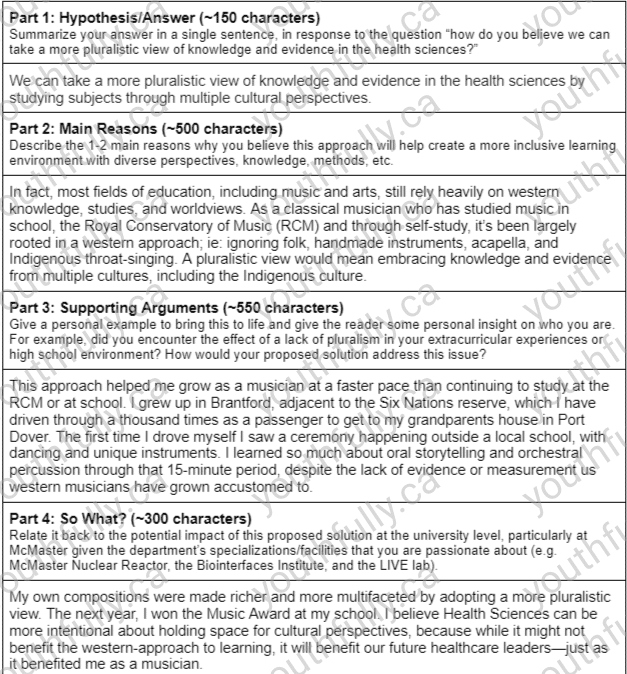
You Might Also Like

Program Guide
McMaster Health Sciences (BHSc): The Definitive Guide for Applicants (2024)
If you’re applying to McMaster Health Sciences (BHSc), or you’re simply interested in learning more about the program, this guide… Read more
2020/2021 McMaster Health Sciences Supplementary Application
The 2020/2021 Supplementary Application asked students to write three essays total. For Question 1 and Question 2, applicants had to choose Option A or Option B for each. For Question 3, there was no option choice.
McMaster Health Sciences Supplementary Application: Question 1 – Overview
For this question, you’re asked to answer one of the two options. They are:
McMaster BHSc Supplementary Application – Essay Question 1A
McMaster BHSc Supplementary Application: Question 1A – Breakdown
“In the Nichomachean Ethics, Aristotle proposed that “virtue is the golden mean between two vices, the one of excess and the other of deficiency.” For the list of virtues below, which one is the hardest for you to achieve a balance in, and do you tend to an excess or a deficiency in that characteristic? What strategy(s) could you use to better achieve balance for yourself?”

McMaster BHSc Supplementary Application: Question 1A – Template
Get started on your template here (Click File > Make a Copy).
Following our Deductive Communication Approach™, the general structure of your answer to this question should have these four parts:
- Part 1: Hypothesis/Answer (~100 characters)
- Clearly identify the virtue you find the hardest to achieve balance, along with the characteristic you have excess/deficiency in.
- Part 2: Main Reasons (~250 characters)
- Provide 1-2 reasons you believe this virtue is hard for you to achieve and explain why.
- Part 3: Supporting Arguments (~400 characters)
- Use personal examples, life experiences, ECs, etc. to strengthen your case.
- Parts 4-5: So What?
- Write a strategy that will help you achieve better balance with this virtue. State the rationale for believing this strategy will be effective in striking a balance to make you less deficient/excessive. Then, wrap up the response by discussing how you will execute the strategy, as well as the values it will bring to others.
COACH’S TIP: Don’t worry about writing complete sentences at first. Just write 2-3 bullet points under each section, just to get your ideas down. You can edit and perfect your answers later. If you’d like some more tips about making the essay writing process easier, read this blog.
Want some more guidance on how to approach questions like this one? Check out this video:
McMaster BHSc Supplementary Application: Question 1A – Examples
Here are some McMaster Health Sciences essay examples.
REMEMBER: Please note that all of the examples in this guide are EXAMPLES ONLY and are NOT meant for you to copy.
Question 1a – McMaster BHSc Essay Example (1/2): Virtue = Adaptability; Excess = Compliance
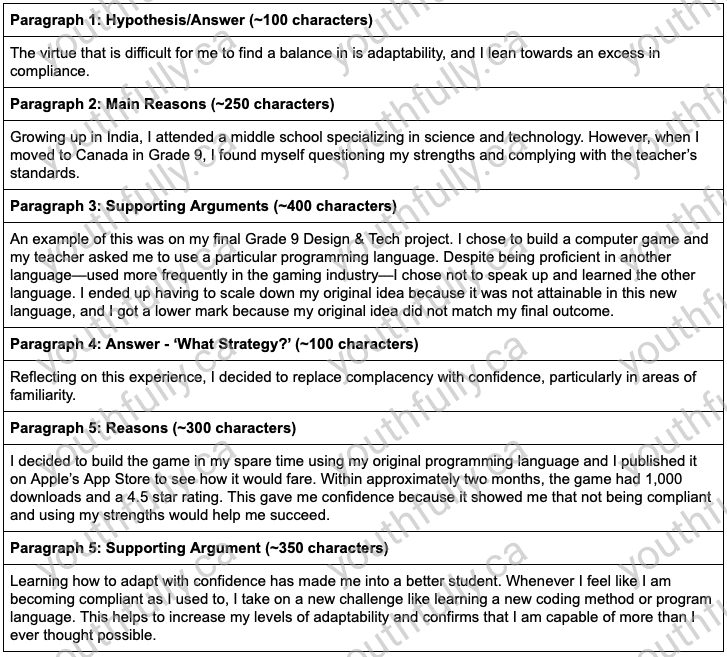
Question 1a – McMaster BHSc Essay Example (2/2): Virtue = Moderation; Excess = Self-Deprivation
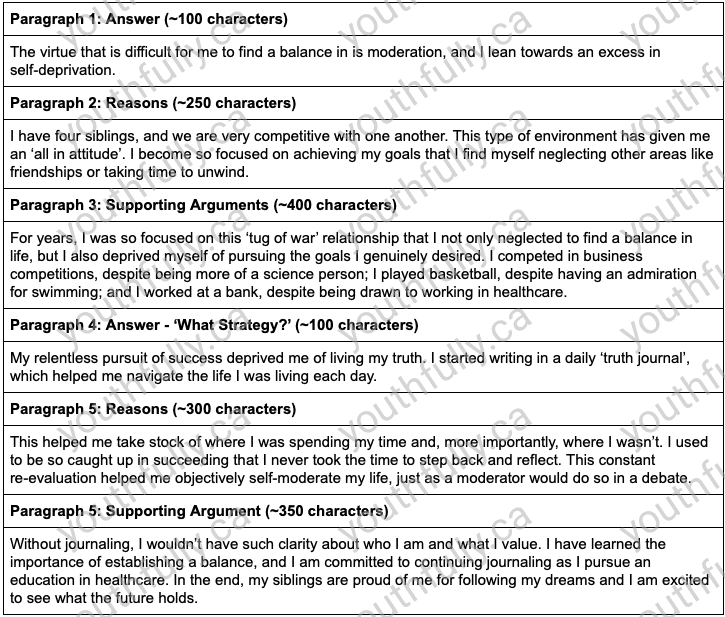
McMaster BHSc Supplementary Application: Question 1B – Breakdown
“In her 1993 novel Ravensong, author, poet, educator, and member of the Stó:Lō nation Lee Maracle wrote “Where do you begin telling someone their world is not the only one?” What is your interpretation of this line?”
You might be jumping to Amazon and ordering a copy of the book, or researching the Stó:Lō nation, which is absolutely fine. But don’t do that approach alone.
In summary, Ravensong is about the ‘gulf’ between two cultures. It’s a tale about an urban Native community devastated by an influenza epidemic (reminds you of something). The main character is a young Indigenous woman struggling between the clash between white society’s values and her own family’s ways.
What does that mean? For example, the word “flu” might mean one thing to white society and a completely different thing to the Indigenous culture. This is called heteroglossia, and it’s an important theme in the book. If people aren’t interpreting differences in meanings of words, then there isn’t a lot of individual thought happening.
McMaster BHSc Supplementary Application: Question 1B – Template
Get started on your template here (Click File > Make a Copy).
The general structure of your answer to this question should have these four parts:
- Part 1: Hypothesis/Answer (~250 characters)
- Summarize your interpretation in 2-3 sentences. Try to make it unique and use language that really draws in your reader.
- Part 2: Main Reasons (~400 characters)
- State a strong reason(s) why you believe your interpretation to be true.
- Part 3: Supporting Arguments (~550 characters)
- Use personal examples, observations, experiences, etc. to support your argument and make your answer more convincing.
- Part 4: So What? (~300 characters)
- Restate how your argument supports your interpretation, then explain why this interpretation is important and brings value to yourself or the rest of society.
COACH’S TIP: In this section, make sure you showcase your problem solving and critical thinking skills by coming up with an answer and interpretation that’s unique. Not sure how? Check out this blog and connect with a coach for support.
Check out this video for more tips on writing essays for questions like Question 1, Option B:
McMaster BHSc Supplementary Application: Question 1B – Examples
Here are some examples for this McMaster BHSc essay question:
Question 1b – McMaster BHSc Essay Example (1/2): Theory of computer ‘simulation’
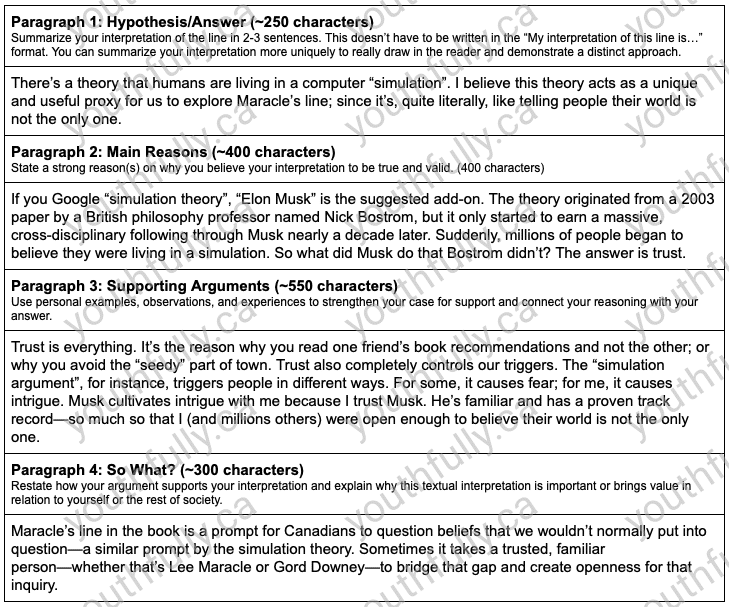
Question 1b – McMaster BHSc Essay Example (2/2): Unique experiences and sensations
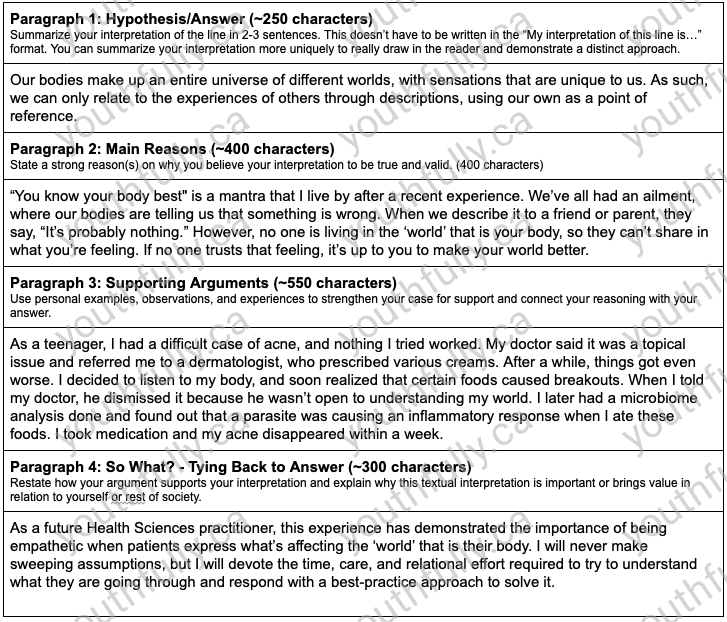
Find the mentor you’ve been looking for.
get a youth coach™
McMaster Health Sciences Supplementary Application – Question 2
For this question, you’re asked to answer one of the two options. They are:
McMaster BHSc Supplementary Application: Question 2A – Breakdown
“Write a short letter about an issue you care about, addressed to the appropriate political figure for the area of your concern.”
McMaster BHSc Supplementary Application: Question 2A – Template
Get started on your template here (Click File > Make a Copy).
The general structure of your answer to this question should have these four parts:
- Part 1: Hypothesis/Answer (~250 characters)
- Start as if you are really writing a letter by saying “Dear [Recipient Name]”. Tell him/her why you are writing this letter, and explain the issue you want to address and what your objective is for writing this letter.
- Part 2: Main Reasons (~500 characters)
- Address the most important reasons why the issue is, in fact, an issue. Who or what has this issue impacted? What will happen if no one addresses it? Try to make this as personal as possible and give examples to connect with the reader and tell them more about you.
- Part 3: Supporting Arguments (~500 characters)
- Elaborate on 1-2 key reasons and provide some evidence. What does this person expect to gain if they address this issue? Do your research on this person and tie these reasons directly to him/her.
- Part 4: So What? (~300 characters)
- Conclude the letter and briefly summarize why this issue is important again.
McMaster BHSc Supplementary Application: Question 2A – Examples
Here are McMaster Health Sciences essay examples for this question.
REMEMBER: Please note that all of the examples in this guide are EXAMPLES ONLY and are NOT meant for you to copy.
Example 1: Letter to Stephen Lecce, Ontario Minister of Education
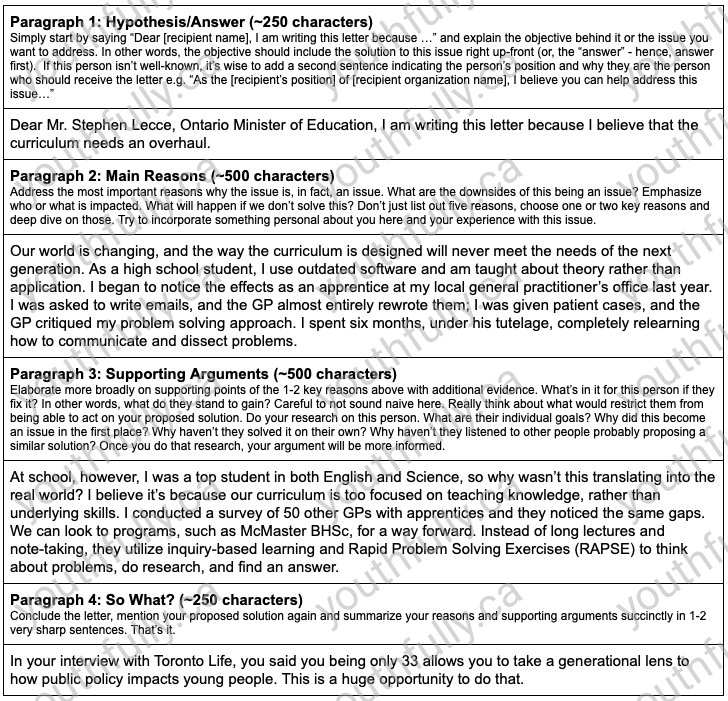
Example 2: Letter to Dr. Merrilee Fullerton, Minister of Long-Term Care in Ontario
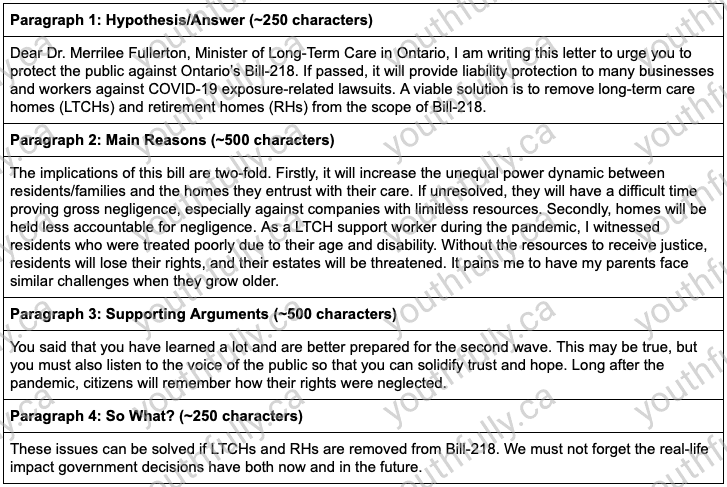
Need some extra help with answering questions like this? Connect with a coach and watch this helpful video:
McMaster BHSc Supplementary Application: Question 2B – Breakdown
“In her 1954 essay The Crisis in Education, Hannah Arendt says, “Education is the point at which we decide whether we love the world enough to assume responsibility for it.” How does your view of education compare to Arendt’s?”
McMaster BHSc Supplementary Application: Question 2B – Template
Get started on your template here (Click File > Make a Copy).
The general structure of your answer to this question should have these four parts:
- Part 1: Hypothesis/Answer (~200 characters)
- Start by answering the question, and summarizing how your view of education compares to Arendt’s view, and choose a certain component/characteristic of her view to agree/disagree with. Limit yourself to two sentences.
- Part 2: Main Reasons (~550 characters)
- Explain your answer by providing the key reason(s) behind your view. Try to be as unique as possible, while using examples from your life to give personal insight and help the reader learn more about you.
- Part 3: Supporting Arguments (~550 characters)
- Expand upon your answer with the most compelling 1-3 arguments that support your reason above. Show that you’ve really taken time to think about the topic and have come up with something unique.
- Part 4: So What? (~300 characters)
- Write a simple conclusion that expands upon why this viewpoint matters and how it can help us interpret Ardendt’s view.
McMaster BHSc Supplementary Application: Question 2B – Examples
Here are some McMaster BHSc essay examples for this question.
Question 2b – McMaster BHSc Essay Example (1/2): Education and theory vs. practice
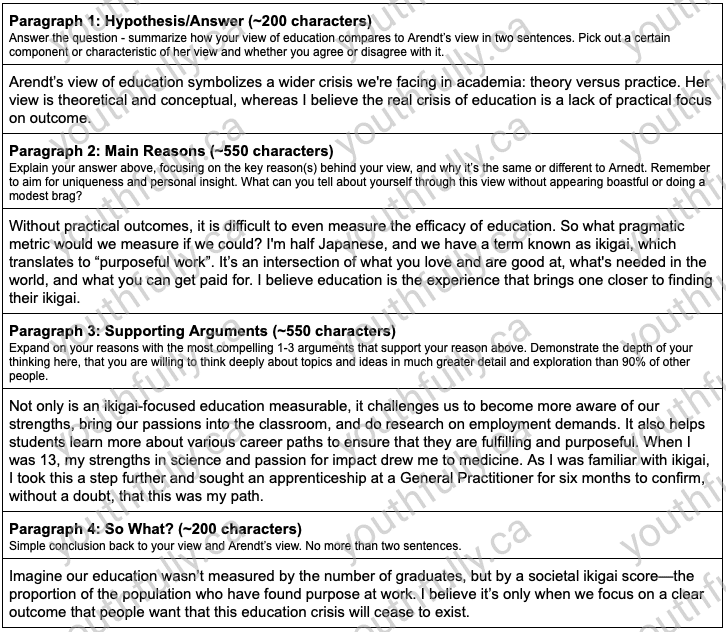
Question 2b – McMaster BHSc Essay Example (2/2): Education is a lifelong process
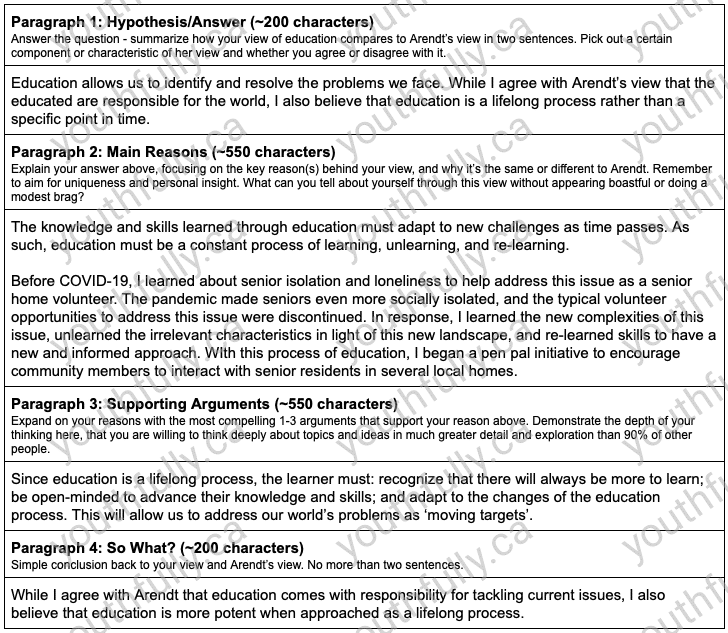
Want some more help with questions like this one? Watch this video:
McMaster Health Sciences Supplementary Application – Question 3
“What do you think ‘A’ and ‘B’ could be, and what would your interpretation of the data be in that case?”
Read the full case study for Question 3 here.
This is a problem-solving based question, where you’re given a large amount of data and a situation is presented to you through a narrative based on a research study. You must then formulate an explanation for the data that is presented.
Start by making some notes about the observations and relevant data that is given to you.
Before getting started, check out this video on how to approach problem-based questions and come up with strong Hypothesis/Answer, Main Reason(s), Supporting Arguments, and So What? sections:
McMaster BHSc Supplementary Application: Question 3 – Template
Get started on your template here (Click File > Make a copy).
The general structure of your answer to this question should have these four parts (click here for a full breakdown of each):
- Part 1: Hypothesis/Answer (~250 characters)
- State what your interpretation of ‘A’ and ‘B’ is, referencing the time elapsed and change in variables from the before and after state.
- Part 2: Main Reasons (~550 characters)
- Present 1-3 strong reasons why you believe your interpretation to be true, and reference the data trends between the before and after state for bars A and B.
- Part 3: Supporting Arguments (~600 characters)
- Use observations from your logic tree, table of facts & unknowns, and hypothesis validation tables to support and connect your reasoning with your answer. Make sure to use personal experiences and insight to explain why you interpret that data in this way.
- Part 4: So What? (~300 characters)
- Restate how your arguments support your interpretation and discuss why this interpretation matters, and what conclusions you can draw from it.
COACH’S TIP: Since this question is more complex than the others, start by writing some brief bullet points under each part. This is an important part of the essay writing process, and will ensure that your points make sense and are connected to one another. For help with the process of writing and creating these bullet points, check out our Deductive Communication Approach™ Guide.
McMaster BHSc Supplementary Application: Question Question 3 – Example
Here’s a McMaster BHSc essay example for this question.
REMEMBER: This is an EXAMPLE ONLY and is NOT meant for you to copy.
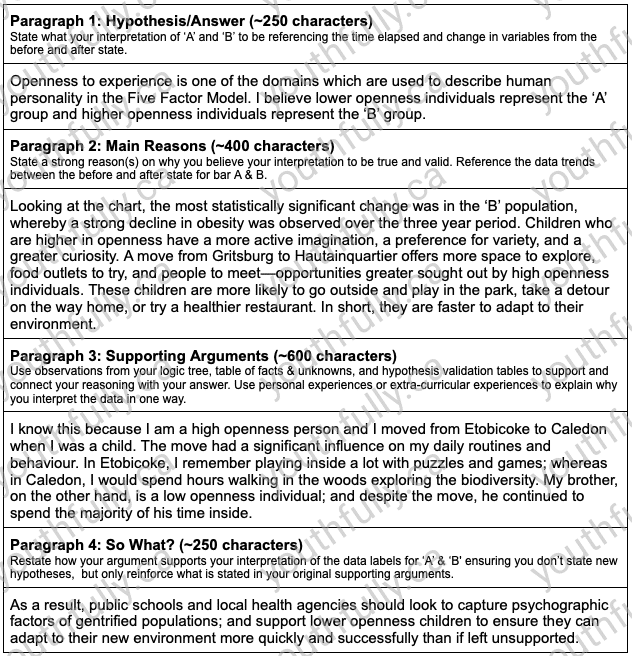
You’ve Got a Dedicated Coach in Your Corner
For over a decade, we have worked with thousands of students to help them achieve more than they ever thought possible.
Our coaches have a strong success rate supporting students as they apply to McMaster Health Sciences (BHSc), among other top university programs.
Our 1-on-1 Youth Coaching fills that gap that most high schools miss. We can help you build self-awareness through probing questions and assessments, set bigger goals to elevate your extracurriculars and future career plans, and improve skills that matter on supplementary applications, such as interviewing, written communication, critical thinking, and creativity.
We use a coaching methodology, called ‘full student’ development, that’s been proven to increase your chances of admission to top-tier universities and obtaining competitive jobs/internships.
So, what are you waiting for? Fulfill your post-secondary potential with the mentorship and coaching you’ve always wanted! 🙂
IMPORTANT: Want to share information and/or images from this resource on your own website, blog, article, etc.? Please ensure you reference content of any kind published by Youthfully Inc., in whole or in part, using the following statement: (1) Our Organization (Youthfully Inc.); (2) The title of our content/resource; and (3) the URL to our webpage where the content was originally posted. For example: “Sourced from: Youthfully Inc., ‘McMaster BHSc: Supplementary Application Essay Examples & Templates 2023/2024’, https://youthfully.com/mcmaster-health-sciences-supplementary-application-examples/.”
Not doing so is an infringement of copyright and is illegal. We spend significant time developing resources for students, so please take a few seconds to ensure they are referenced properly.
DISCLAIMER: While the information in this blog is considered to be true and correct at the date of publication, and although our team makes every attempt to ensure that the information is accurate and vetted by university staff, Youthfully is not in any way liable for the accuracy of any information printed and stored or in any way interpreted and used by a user.
2022/2023 Question 1
2022/2023 Question 2
2021/2022 Question 2
2020/2021 Essays
Get 1-on-1 Support

